How to Craft your coaching business plan in 7 simple Steps (+ FREE Template)

September 24, 2023
August 6, 2024
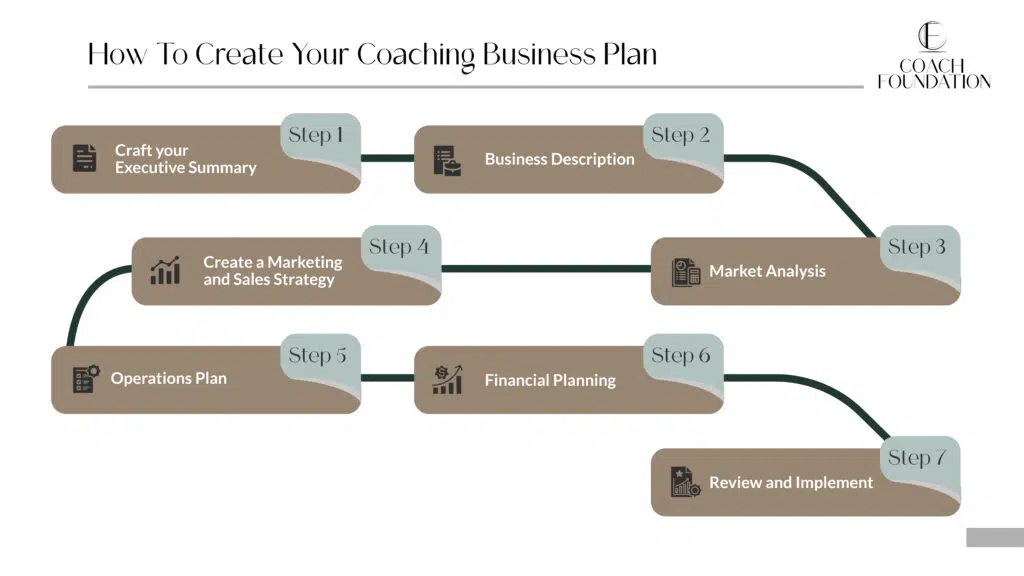
Are you eager to launch your coaching business but feeling overwhelmed about where to start?
You’re not alone!
In this article, I’ll help you understand what a coaching business plan involves. I’ll provide you with a coaching business plan template and also teach you how to shape it so that it mirrors your vision and goals. I’ll walk you through every step to ensure you create a successful coaching business plan tailored to your niche.
Let’s dive into the world of business planning, where clarity meets strategy.

In Brief : How to Craft your coaching business plan in 7 simple Steps
- Step 1: 📝 Executive Summary – Craft a compelling summary that encapsulates your business vision, mission, and core elements like the business name, owner, and location, setting the stage for what follows.
- Step 2: 🗂️ Business Description – Detail your coaching services, niche, and operational mechanics. Explain how these elements work together to meet the needs of your clientele.
- Step 3: 🔍 Market Analysis – Conduct a thorough analysis of your target market and competition. Use this data to tailor your services and pinpoint market opportunities.
- Step 4: 📈 Create a Marketing Strategy – Develop a comprehensive marketing plan that includes digital and traditional methods to attract and retain clients, ensuring your brand stands out.
- Step 5: ⚙️ Operations Plan – Outline your business’s operational structure, including the logistics of daily operations and the roles of your team members.
- Step 6: 💰 Financial Planning – Forecast your business’s financial health with detailed budgeting, pricing strategies, and expected financial outcomes.
- Step 7: 🚀 Review and Implement – Regularly review and refine your business plan to ensure it remains relevant and effective
Do You Need a Coaching Business Plan?

A few years ago, I was just like you—excited yet baffled about the right steps to take in starting my coaching business. I dabbled in social media, attended conferences, tried podcasting, and explored various other avenues.
Despite my efforts, the results were far from what I needed. It felt like I was constantly moving, but not in the right direction.
Then it clicked. I realized that diving headfirst into business without a well-thought-out plan was like sailing without a compass.
So, I took a step back and started from scratch, this time with a clear strategy in mind. I laid out a business plan that not only guided my business to success but also continues to guide me today.
Starting a coaching business can be an exciting venture , but without a clear plan, it’s easy to lose direction and focus. A business plan helps you outline your business objectives and also provides a roadmap to achieve them.
Here’s why a business plan is vital for a coaching business:
- Clarity and Direction : A business plan defines your coaching business’s purpose and sets clear goals. This clarity guides your decisions and keeps you focused on long-term goals.
- Understanding Your Market : Who are your potential clients? What are their needs and how can your coaching services meet those needs? Analyzing the market helps you tailor your offerings. It also helps you stand out from competitors. This ensures your services are in demand.
- Attracting Investors and Funding : Investors want to know that their money is going into a venture. The venture must have a clear plan to make a profit. This will give potential investors the confidence to back your business.
- Measuring Progress and Success : A business plan sets a baseline for measuring your progress. Setting clear goals and milestones helps you track progress and adjust strategies as needed. This ongoing review keeps you on track and informs smart decisions that drive your business forward.
- Risk Management : All businesses, including coaching ones, face risks. A business plan helps predict and manage these risks, making it easier to handle challenges. It prepares you for economic downturns, shifts in consumer behavior, and new competitors. This proactive approach protects against unexpected problems.
How To Create Your Coaching Business Plan
A well-structured business plan outlines every critical component of your operation, from your business identity and client demographics to your financial management and growth strategy.
Before we jump straight into the coaching business template , let’s understand the structure of your coaching business plan:

- Step 1: Craft your Executive Summary
- Step 2: Business Description
- Step 3: Market Analysis
- Step 4: Create a Marketing and Sales Strategy
- Step 5: Operations Plan
- Step 6: Financial Planning
- Step 7: Review and Implement
1. Crafting Your Executive Summary
To start your coaching business, begin with a powerful executive summary in your business plan. This section is like the front cover of a book—it needs to captivate and inform.
Here’s how to craft an executive summary that sets the stage for a compelling business plan:
- Business Name and Location : Clearly state the name of your coaching business and where you are based. This basic info introduces your business.
- Services Offered : Describe the types of coaching you provide. You might specialize in life coaching, career coaching, or another niche. Give a snapshot of what you offer.
- Mission Statement : Your mission statement should reflect the core values and purpose of your business. It tells your audience what your business stands for and what you aim to achieve.
- Vision Statement : This is about the future. Where do you see your coaching business going? What impact do you want to make? Your vision statement paints a picture of the future you are working towards.
- Goals and Objectives : Jot down your short-term and long-term objectives for your coaching business using the SMART criteria—Specific, Measurable, Achievable, Relevant, and Time-bound . Short-term goals might include reaching a certain number of clients. Or, they might include achieving a set income within the first year. Long-term goals could involve expanding your services nationally. Or, they could involve developing a franchise model.
2. Business Description
Here, you explain what your business does, how it operates, and what it aims to achieve.
This section gives context for the rest of the business plan. It helps stakeholders understand your business at a detailed level.
Choose Your Niche
Choosing a coaching niche and specifying your services are key. This sets your business apart.
Detail your target market. Whether you focus on life, executive, or health coaching, each meets unique client needs. Focus on demographics like age, profession, or specific challenges. Your coaching addresses those challenges.
Explain how your services are tailored to meet these needs, and discuss your business’s competitive edge. List your services in this field. Include personal coaching, group workshops, and online courses.
Also, showcase what makes you unique. For example, you might have a special coaching method. Or, you could be highly skilled in a popular coaching area.
Business Structure
The structure of your coaching business can greatly impact its operations and growth. You may operate as a sole proprietorship, a partnership, or a corporation. Each type has its own implications.
A sole proprietorship is easy to start and gives you full control. But it also leaves you fully liable for debts. On the other hand, a corporation shields you from debt and can attract investors. It does this through its structure and ability to sell shares. However, corporations face more rules and taxes.
Choose the structure that fits your business goals. Consider how it affects liability, taxation, and investment.
Business Model
Your coaching business can adopt various models to deliver its services, depending on your target market and your expertise:
- One-on-One Coaching: Tailored specifically to individual clients to address personal or professional goals. This model allows for deep, personalized work and can be conducted in person, over the phone, or via video conferencing.
- Group Sessions: These sessions bring together multiple clients who share similar goals or challenges. Group coaching is effective for workshops, seminars, and regular meetings, offering the added benefit of peer learning and support.
- Online Courses: Providing digital courses allows clients to engage with your coaching material at their own pace. This model can include video lectures, downloadable resources, and interactive elements like quizzes or forums.
Value Proposition
What sets your coaching services apart is your unique value proposition.
For instance, your approach might integrate cutting-edge psychological research, or perhaps you offer a unique blend of strategies drawn from various disciplines such as mindfulness, behavioral science, and leadership training.
Maybe your services are particularly tailored to a niche market, such as startup entrepreneurs or corporate executives facing burnout.
Highlighting this uniqueness in your business plan helps potential clients and investors understand why your coaching services are not just necessary but highly desirable.
3. Market Analysis
A thorough market analysis is crucial. It helps you understand your environment. You can identify opportunities and challenges. Then, you can make strategies. These strategies use your strengths to meet market demands.
This part of your business plan will show the whole market. It will offer key insights. These insights will help you set real goals and grow in a lasting way.
Identify your Target Market
Identifying your target market involves defining the specific group of people who are most likely to benefit from your coaching services. Key aspects to consider include:
- Demographics: Age, gender, profession, income level, and educational background. For instance, your services might cater primarily to mid-level professionals aged 30–50.
- Psychographics: Values, interests, lifestyle, and personality traits. For example, this might include people who value personal development, are career-focused, and seek work-life balance.
- Location: Whether your target market is local, regional, national, or global. Online coaching services can broaden your geographical reach compared to traditional in-person sessions.
Market Need
This section details the specific needs your coaching services address.
Are your clients looking for career advancement, personal growth, better stress management, or improved leadership skills?
Understanding these needs allows you to tailor your offerings effectively.
For example, if there is a high demand for stress management techniques among corporate workers in your area, your coaching could focus on mindfulness and resilience training.
Analyze your Competition
Analyzing your competitors helps you understand the current market landscape and identify what sets your coaching apart. Consider the following:
- Who are your main competitors? Look at other coaching services in your niche.
- What services do they offer? Understanding their offerings helps you spot gaps in the market.
- What are their strengths and weaknesses? This can help you learn from their successes and capitalize on areas where they may fall short.
SWOT Analysis
A SWOT Analysis is a strategic method used to evaluate the Strengths, Weaknesses, Opportunities, and Threats.
Use it to analyze your coaching business:
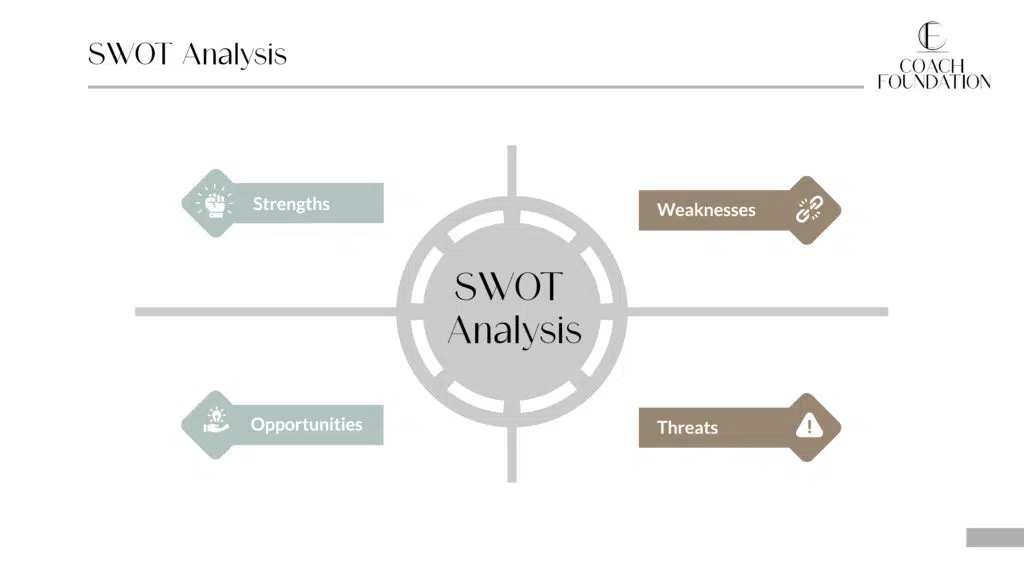
- Strengths: What advantages does your coaching business have? This could be a unique coaching methodology, a strong personal brand, or deep expertise in a niche area.
- Weaknesses: What areas need improvement? This might include limited market presence or lack of full-time coaching staff.
- Opportunities: Look for external factors that could be advantageous for your business. This could include increasing demand for mental health services or expanding into online coaching.
- Threats: Identify potential challenges that could hinder your business’s success. These might include new competitors entering the market or changes in regulatory laws affecting coaching services.
4. Marketing and Sales Strategies

An effective marketing and sales strategy is critical for the success of any coaching business. This part of your business plan outlines how you will attract and keep clients.
It details your approaches to reaching your target market and turning leads into paying customers. The right strategy boosts visibility. It also improves client engagement and loyalty.
A well-crafted marketing plan is essential. It sets clear goals and identifies the best tactics to reach them. It ensures your marketing is consistent, targeted, and effective. They help build brand recognition and trust.
Developing your coaching brand involves creating a distinctive identity that resonates with your target audience and sets you apart from competitors.
Key elements include:
- Brand Message: What are the core messages you want to convey? This could be your commitment to helping clients achieve specific goals, like improving leadership skills or finding work-life balance.
- Visual Identity: Includes your logo, color scheme, and overall visual style. These should reflect the tone and ethos of your coaching practice.
- Brand Voice: How you communicate in written and spoken words, which should consistently reflect your values and appeal to your target audience.
Marketing Channels
To reach your potential clients effectively, utilize a mix of marketing channels tailored to where your audience spends their time:
- Social Media: Platforms like LinkedIn, Instagram, and Facebook can help build community and engagement. Tailor your content strategy to each platform to maximize reach and engagement.
- Speaking Engagements: Presenting at conferences or local events can establish you as an expert in your field and attract clients looking for proven guidance.
- Networking: Building relationships through industry groups or local business events can lead to referrals and new client opportunities.
- SEO: Optimize your website and content for search engines to attract organic traffic. Focus on keywords that potential clients might use to find coaching services.
Effective marketing can significantly boost your coaching business, attracting a steady stream of clients. It not only draws attention but also captures and retains interest
Sales Strategy
Converting potential clients into paying clients requires a clear sales process:
- Initial Consultation: Offer a free or discounted initial consultation to introduce potential clients to your coaching style and the benefits of your services.
- Follow-Up: After the consultation, follow up with a personalized message that summarizes how you can help them achieve their goals.
- Special Offers: Consider time-limited offers or package deals to encourage sign-ups.
Set up a sales funnel. A sales funnel is a process that guides potential clients from their first interaction with your brand through various stages of engagement until they make a purchase.
It starts with awareness, often through your marketing efforts, and progresses to interest (engaging with content), decision (attending a consultation), and finally action (purchasing a coaching package).
5. Operations Plan
The Operational Plan section of your business plan provides a detailed look at how your coaching business works. This section outlines the day-to-day operations that support your coaching business.
This includes preparing for client sessions, both scheduled and ad-hoc and follow-up activities for each session, client communication, and administrative tasks like scheduling, billing, and client records management.
It’s important to specify how these tasks are handled and by whom, as well as any business hours or response time commitments you make to your clients.
Business Location
Where you operate your business significantly shapes how it runs. Specify whether you offer your coaching services online, offline , or in a hybrid model:
Technology Used
Technology is crucial in running a modern coaching business efficiently. List the specific technologies and software you utilize for various business functions:
- Client Management Systems : Software for scheduling , session notes, and client progress tracking.
- Communication Tools : Tools used for client communication, such as email platforms, video conferencing tools, and instant messaging apps.
- Marketing and Sales Software : CRM systems for managing leads, marketing automation tools, and analytics platforms.
Staff and Resources
Finally, detail any staff or additional resources needed to operate your business effectively. This includes any administrative support, marketing personnel, or additional coaches.
If you handle most operations solo, discuss any outsourced services you might need, such as virtual assistants, accountants, or IT support.
6. Financial Planning
The Financial Plan is a critical section of your business plan. It is crucial for both potential investors and for you as the owner.
It shows that your coaching business is financially viable. It gives a roadmap for financial success.
This section is crucial for securing funding. It shows you understand your business’s finances.

Startup Costs
Outline all initial costs required to start your coaching business. This includes any licensing fees, initial marketing expenses, technology setup costs, office equipment, and any other expenditures necessary to launch your business.
Pricing Strategy
Set your prices for your coaching services based on the value you provide, the demands of your target market, and your competitors’ pricing. You can also offer different pricing tiers based on the length and depth of the coaching provided or discounts for upfront payments for a series of sessions.
Revenue Projections
Project your revenues over the next three to five years. Base these estimates on your market analysis, including expected client numbers, session pricing, and any additional revenue streams like workshops or online courses.
Break-even Analysis:
Calculate when the business expects to break even. This analysis should consider all fixed costs (like rent and salaries) and variable costs (such as session materials or payment processing fees) against expected revenue streams. The break-even point is the moment when total revenues equal total costs, indicating when the business starts to generate profit beyond recovering its initial and operational costs.
Think of it like this: if you have a lemonade stand, you need to know how many cups of lemonade you have to sell to pay for all your supplies and costs. The moment you’ve sold enough cups to cover all your expenses, you hit your “break-even point.” That means you’re not losing money anymore, and any more lemonade you sell after that starts to make you profit.
7. Review and Implement
Once you’ve finalized your coaching business plan, the next steps are critical: reviewing the plan carefully and implementing it effectively.
This ensures that your business is built on a solid foundation and is ready to adapt to challenges and opportunities. Here’s how to approach these important phases:
Reviewing Your Business Plan
- Thorough Read-through: Start by reading your business plan thoroughly from start to finish. This helps you ensure that the plan is cohesive and all parts align well with each other.
- Seek External Feedback: It’s invaluable to get perspectives from trusted mentors, industry peers, or potential investors. They can provide insights that you might have missed and suggest improvements. Consider feedback from people who understand the coaching industry as well as those who might be part of your target audience.
- Revise for Clarity and Accuracy: Based on the feedback and your own assessments, make necessary revisions. This could involve clarifying certain sections, adding missing details, or correcting any inaccuracies. Ensure your financial forecasts and market analysis are realistic and based on the latest available data.
- Finalize the Document: Once revisions are made, finalize the formatting, proofread for grammatical errors, and ensure that the document is professionally presented.
Implementing Your Business Plan
Now that your business plan is meticulously crafted, it’s time to bring it to life. This step might seem a bit overwhelming, but it’s essential for growing your coaching business.
The great news is, you’re not in this alone. We’re here not just to support you but to actively participate in your journey.
Our role extends beyond mere guidance; we’re here to help build your business. While you concentrate on what you do best—coaching and transforming lives—we’ll handle the operational details. From identifying your niche to marketing execution, we’ve got you covered .
As we wrap up, I hope the insights shared here have empowered you to create a structured and effective business plan for your coaching venture.
Crafting a solid plan is crucial, not just for guiding your business but for adapting as your enterprise grows.
If you have any questions about the business planning process or wish to share your own experiences and insights, feel free to leave a comment below.
Resources for your Coaching Business Plan
As a coach, it’s crucial to have the right resources at your fingertips.
We’ve put together a curated list to support your journey to craft your custom coaching business plan.
Your Custom Template
To get your FREE custom Coaching Business Plan Template, click on the “Download Your Coaching Business Plan” Button
Other resources
Financial planning and management tools.
- QuickBooks : An accounting software ideal for small businesses to manage accounts with ease.
- Mint : Helps with personal and business financial planning and budgeting.
- Microsoft Excel / Google Sheets – Spreadsheet tools that are essential for financial analysis, including creating detailed financial projections and budgets.
Software and Online Platforms
- LivePlan : This is an intuitive, user-friendly business plan software that guides you through the process of creating a detailed, investor-ready business plan. It offers templates, financial forecasts, and performance tracking tools.
- Bizplan : Bizplan makes the process of writing a business plan more efficient through step-by-step guidance, templates, and a modern, user-friendly interface that simplifies financial forecasting and business modeling.
- Enloop : This tool automatically writes and formats your business plan as you input information. It offers features like auto-generated financial reports and a real-time performance score to improve your plan.
- SMART Goals – A framework for setting objectives that are Specific, Measurable, Achievable, Relevant, and Time-bound, ensuring well-defined and attainable goals.
- SWOT Analysis – A strategic planning tool used to identify and understand the Strengths, Weaknesses, Opportunities, and Threats related to business competition or project planning.
- PEST Analysis – A framework for analyzing and monitoring the macro-environmental factors that may have a profound impact on an organization’s performance.
- Business Model Canvas – A strategic management template for developing new or documenting existing business models across nine key components.
- Value Proposition Canvas – A tool that helps businesses ensure that a product or service is positioned around what the customer values and needs.
- “ Co-Active Coaching: Changing Business, Transforming Lives ” by Henry Kimsey-House, Karen Kimsey-House, Phillip Sandahl, and Laura Whitworth – This book provides a foundational philosophy for professional coaching.
- “ Business Model Generation ” by Alexander Osterwalder & Yves Pigneur – A book that introduces practical tools for creating, analyzing, and reinventing business models, with visual methods for brainstorming.
- “ The Lean Startup ” by Eric Ries – A book that introduces methodologies for developing businesses and products in an efficient way by managing and directing startup activities toward the markets.
Legal Resources for Small Businesses
- U.S. Small Business Administration (SBA) : Information on business registration, legal structures, and licenses.
- Gov.uk (for UK based businesses) : Guidance on starting and running a business in the UK, including legal obligations.
Each resource was chosen based on its practical utility, ease of access, and the most current information available.
From established industry platforms to cutting-edge tools and insightful publications, our editorial team has researched, fact-checked, and curated a diverse mix of resources to cater to various learning styles and needs.
This ensures you have access to the best tools and knowledge, helping you build a solid coaching business plan.
Frequently Asked Questions (FAQs)
What are the steps of a business plan.
A coaching business plan includes the following steps – making a list of the strengths and weaknesses of the company, moving on to a SWOT analysis, outlining a short-term and long-term strategy, creating project benchmarks, and defining the key success factors. Another additional step is how to price the business and launch a new product.
What Must An Entrepreneur Do After Creating their Coaching Business Plan?
A list of tasks that entrepreneurs should complete after setting up their coaching business plan includes: obtaining startup capital, researching trade laws, reviewing business licenses, and choosing a company name.
What Is the Purpose of Writing a Business Plan Before Entering the Market?
Creating a coaching business plan before entering the market can prove beneficial because it allows entrepreneurs to look at the big picture of the company, from the way it will be run to its goals and general purposes. It also gives entrepreneurs an opportunity to look at what they need to do in order to successfully and efficiently run their business.
What Should I Include In A Business Plan?
Every business plan needs to include the questions and answers of these three fundamental issues: what do you want your company to accomplish, why should people buy what you sell, and how will you make it happen? It is important to take this opportunity to be very thorough with your business plan.
How to Make a Business Plan?
To make a business plan, you must know what kind of business you want it to be. You will need to research your market, competition, and finances. If you don’t, then you run the risk of running out of money or building a business that is unable to make a profit.
How Do You Draft A Coaching Plan?
You can draft a coaching plan through plenty of documents and templates that can be used as a guide to help you brainstorm and organize your own thoughts. One great resource is the Coaching Business Plan Workbook and Guide by Mary Baldwin and Amy Levin-Epstein.
How To Write A Business Plan Step By Step?
The precise step-by-step guide on how to write a business starts with first outlining what your business will be and what your long-term goal is. Next, it’s important to start with developing your company’s mission statement, detailing who your customer is and what they want. This is followed by conducting market research and researching your competition.

ABOUT SAI C.N.G. BLACKBYRN
I’m Sai C.N.G. Blackbyrn, better known as “The Coach’s Mentor.” I help Coaches like you establish their business online. My system is simple: close more clients at higher fees. You can take advantage of technology, and use it as a catalyst to grow your coaching business in a matter of weeks; not months, not years. It’s easier than you think.

4 thoughts on “How to Craft your coaching business plan in 7 simple Steps (+ FREE Template)”
This article was very simple and easy to follow. Extremely helpful. Just starting out so needed this kinda help.
Hi J Dawn, I’m glad you got great value from this piece. And since you are just starting out, the webinar would be extremely helpful to you so do register
Thank you so much, very insightful especially as I’m starting my coaching business.
Keep up the great work!
Leave a comment Cancel reply
- Coaching Solutions
How To Write A Life Coaching Business Plan: 5 Templates

If you’re passionate about helping others fulfill their potential and reach new heights, life coaching could be a truly rewarding career for you.
This guide will show you how to create a coaching business plan that will help you turn your ideas into reality, so that you can start creating value and deliver real results to your life coaching clients.
5 Tips For Starting Your Life Coaching Business
Starting out as a life coach can seem like a big move, and there’s plenty to consider. For many experienced life coaches, it’s balancing the support, guidance, and coaching theory side of things business admin that can be a little tricky.
Maybe you see yourself more as a development professional than an entrepreneur, or perhaps you’ve helped others professionally but never quite had your own practice.
Regardless of where you are in the coaching game, here are some tips that can help you get started building a life coaching business of your own: [1]
- Decide on a clear, unique value offer. Life coaching is incredibly popular, and that’s not changing anytime soon. To distinguish yourself as a coach, think about the unique value you’ll create for your clients – what’s original about the results you can help them achieve, or how you help them get from A to B?
- Consider accreditation. The right life coaching certification can arm you with useful skills and knowledge in your field while boosting your credibility as a coach. There are plenty of qualifications available online for coaches, and you may find one that goes a long way to enhance your marketability.
- Set your business up, practically. Various states, regions, and countries have different systems for registering and starting an online coaching business. Make sure you allow time to collect or create all the coaching forms you’ll need to enroll and manage your clients.
- Develop or curate your coaching resources. To practice, you’ll need tools such as life coaching worksheets , lessons, exercises, videos (if you’re using them), and more. Create a database of all the coaching tools you’ll need so you know just where to find them when you land your first client!
- Create an online presence. Think about how you’ll reach out to clients, and prepare the things that will help you be discovered online. Some examples include a coaching website , social media profile, or listings in online coaching directories. A strategic way to approach this is by developing a marketing strategy, which covers all the ins and outs of how you’ll grow your visibility.
How To Write A Coaching Business Plan: 2 Examples
A coaching business plan should help you clarify why and how you’ll start and run your coaching practice, as well as the tools you’ll need to help others.
Creating a life coaching business plan might sound terrifying, don’t be put off. You can go into more detail if you prefer a comprehensive organizational roadmap, but your business plan should quite simply help you:
- Clarify your “Why” – What is the ultimate purpose of your business? What is your desired future vision for your practice and clients?
- Solidify your “How” – What are your coaching objectives/your mission? What approaches will you use to achieve them?
- Determine your “What” – Understand the interventions, tools, lessons, or solutions that will help you on your mission.
Depending on the depth of detail you’d like to go into, you can break your plan up into more or fewer sections.
The following two coaching business plan examples illustrate this.
Example 1: Lean Life Coaching Business Plan
A lean business plan is ideal for explaining your coaching practice succinctly, or if you’re planning a small coaching business.
Using this USA Small Business Administration sample as a guide, your lean coaching plan might include the following headings: [2]
- Business identity
- Target client
- Client pain points
- Your solution
- Your competition
- Revenue streams
- Marketing activities
- Team and their key roles, and
Lean coaching business plans can be particularly helpful if you’re keen to refine and enhance your business plan as you learn and gain experience.
Example 2: Life Coaching Business Plan Template
This life coaching business plan template from Profitable Venture is a more comprehensive example, starting with an executive summary and ending with a startup expenditure budget. [3]
SWOT and market analyses are used for an in-depth assessment of potential opportunities, threats, and rivals in the coaching industry.
3 Helpful Templates and Samples For Your Plan
Here are a few good examples of coaching business plans, including some extra sections you might want to include:
- 9 Steps to a Lean Life Coaching Business Plan from Coaching Online – this covers a few more sections such as your competition, marketing, and finances [4]
- Traditional Business Plan from the USA Small Business Administration – a traditional business plan that may work well for larger coaching practices [5]
- Business Plan Template for a Startup from Score.org – a 9-step template for new business owners. [6]
Creating A Business Plan For Your Online Coaching Business
Once you’ve decided on the most relevant format for your business plan, you’ll want to formalize it by writing it all down.
You will most likely be referring to it regularly, as you structure, run, manage, and grow your coaching practice, so it’s critical to keep your plan along with the rest of your business documents.
A quick, straightforward solution for most coaches is to create a digital business plan, as we’ve started to do below using Quenza:

Using Quenza’s Activity Builder , you can create custom sections for each element in your plan, as well as text boxes for all the information that will go into your tool.
This helps you store your plan in your coaching portal alongside your Client profiles, activities, and other coaching tools, so your plan is always near at hand as you start to build your business.
To create your own coaching business plan using Quenza’s Activity Builder, simply:
- Open and title a new Activity
- Create sections for each header of your plan, and
- Save your Activity to your Library when it’s done!
You can also print your plan as a PDF, or access and edit at any time on Quenza’s client app, as shown below:

There’s no right or wrong way to create a coaching business plan template, so don’t be afraid to add in headers or sections as your plan grows. As long as your plan takes you through each milestone of building and running your business, you’re on the right path to creating a successful, growing practice.
Best App and Software For Your Coaching Business
Quenza is a state-of-the-art solution for coaching professionals, regardless of where you are in the process of running your business.
Not only can you plan out your business as a first-time coach, but Quenza’s tools can help you deliver solutions, stay in touch with clients, and even market your business as you gain traction.
With Quenza’s features, for example, you can:
- Design, build, and deliver personal and group life coaching solutions
- Craft coaching programs, curricula, or entire e-courses from your existing tools
- Drip feed your solutions to coaching clients automatically, on a schedule
- Create and customize all your coaching contracts , coaching agreements, and feedback forms
- Collect and securely store all your clients’ data with Quenza’s HIPAA-compliant app and coaching platform
- Offer clients a centralized online coaching portal
- Stay in touch with and engage your clients throughout the course of your programs, using notifications, reminders, and multimedia,
- Track, monitor, and evaluate your clients’ progress in real-time, and
- Document your sessions with Quenza’s Client notes.
5 Unique Features Included in Quenza
We’ve already seen how important it is to carve out your niche as a life coach – and of course, you’re most efficient when you decide on your own workflow, processes, and style.
With Quenza’s custom features, you have all the flexibility you need to get creative with solutions and market yourself in a way that suits you.
For instance, you can make use of Quenza’s:
- Multilingual client app – to translate your own or your clients’ Quenza app into 16 different languages, and custom brand colors
- Group or private chat – to share feedback, reminders, or encouragement
- White label feature – to promote your brand by adding your logo to tools, forms, and programs
- Wheel of Life feature – to design personalized life Wheel of Life assessments , and
- Expansion Library – for customizing popular and evidence-based coaching exercises without starting from scratch!
Leveraging Technology for Efficient Client Management
Integrating technology into your life coaching practice can significantly streamline client management and enhance your service delivery. Utilizing software and applications designed for coaching professionals saves time and ensures a more organized approach to managing client data and scheduling.
For example, client management software lets you keep detailed records of each client’s progress, preferences, and session notes. This can help you tailor your sessions more effectively and provide personalized coaching that meets the unique needs of each client. Having all this information in one place allows you to track progress and adjust your coaching strategies as needed easily.
Additionally, automated scheduling tools can eliminate the back-and-forth communication often required to set up appointments. These tools allow clients to book sessions at their convenience, reducing the administrative burden on you and ensuring that your calendar is always up to date. This improves efficiency and enhances the client experience by providing a seamless and professional service.
Finally, consider incorporating video conferencing software into your practice. This allows you to conduct coaching sessions remotely, expanding your reach to clients who cannot meet in person. Video sessions can be just as effective as face-to-face meetings, and the convenience of remote coaching can be a major selling point for potential clients.
Building a Strong Online Presence
In today’s digital age, having a strong online presence is crucial for attracting new clients and establishing credibility as a life coach. A well-designed website serves as your virtual storefront, providing potential clients with information about your services, testimonials, and an easy way to contact you.
Your website should clearly communicate your unique value proposition and showcase the results you have achieved for your clients. Include case studies or success stories that highlight the impact of your coaching. This builds trust and demonstrates your expertise and effectiveness as a coach.
Social media platforms are also powerful tools for connecting with potential clients and building your brand. Regularly sharing valuable content related to life coaching, such as tips, articles, and motivational quotes, can position you as a thought leader in your field. Engage with your audience by responding to comments and messages, and consider running targeted ad campaigns to reach a wider audience.
Additionally, consider creating a blog to share your insights and experiences as a life coach. Blogging helps improve your website’s SEO and provides valuable content that can attract and engage potential clients. Write about topics that resonate with your target audience, and promote your blog posts through your social media channels.
By leveraging these digital tools and strategies, you can build a strong online presence that attracts new clients and reinforces your credibility as a life coach.
Final Thoughts
These tips, templates, formats, and examples will help you craft a strategic business plan that can get your coaching practice up and running – even if you’ve never started a business in your life.
If you have a template of your own to share with your fellow coaches, do let us know in the comments below.
We hope this article was helpful. Don’t forget to start your 30-day, 1 dollar Quenza trial for all the tools you need to bring your business plan to life!
Quenza’s practitioner tools will help you craft and deliver powerful online coaching solutions from any connected device. They contain everything you need to run your life coaching practice digitally for brilliant client outcomes.
- ^ Truex, L. (2021). How to start a home-based coaching business. Retrieved from https://www.thebalancesmb.com/how-to-start-a-coaching-business-1794520
- ^ SBA.gov. (2021). Sample Lean Business Plan. Retrieved from
- ^ Profitable Venture. (2021). Life Coaching Business Plan Template. Retrieved from https://www.profitableventure.com/life-coaching-business-plan/
- ^ Coaching-Online.org. (2021). 9 Steps to a Lean Life Coaching Business Plan. Retrieved from https://www.coaching-online.org/life-coach-business-plan/
- ^ SBA.gov. (2021). Write Your Business Plan. Retrieved from https://www.sba.gov/business-guide/plan-your-business/write-your-business-plan
- ^ Score.org. (2020). Business Plan Template for a Startup Business. Retrieved from https://www.score.org/resource/business-plan-template-startup-business
Leave a reply Cancel
Your email address will not be published.

Download free guide (PDF)
Discover how to engage your clients on autopilot while radically scaling your coaching practice.
Coach, This Changes Everything (Free PDF)

Could this be THE DECISION that changes everything?
Your first name and email are the only things standing between you and 9 SIMPLE STEPS to $1M
By signing up you’re opting in to emails from us about the free masterclass, the podcast, and other helpful guides and goodies. You can unsubscribe at any time.
The link is also in your inbox
Something went wrong!
Please, try again later.

Monetization
How to Start an Online Coaching Business in 2025 (8 Steps)
If you’re looking to level up your coaching, this guide will help you set up an online coaching business.
By Mighty Team
April 9, 2024
14 min read
IN THIS ARTICLE
Coaches are thriving.
The International Coaching Federation estimated that the coaching industry grew by $20 billion USD and increased by 54% between 2019 and 2022 .
So if you're looking to earn 6- or even 7- figures by helping people transform their lives, that's a fantastic calling. And the time is now.
In this article, we're going to give you everything you need to know about starting a coaching business. This includes:
- Validating an offer and finding your ideal clients
- Choosing a profitable coaching business model
- Launching and scaling a thriving coaching business
If you’re interested in learning how to start an online coaching business, but unsure where to start, this guide will walk you through what you need to know.
Try the platform with the most $1 million communities.
Start Your Free Trial
What is online coaching?
Online coaching is when a coach offers transformative products and services over the internet--almost always including some type of virtual meeing with clients. This can be done through video or audio calls, or even messaging.
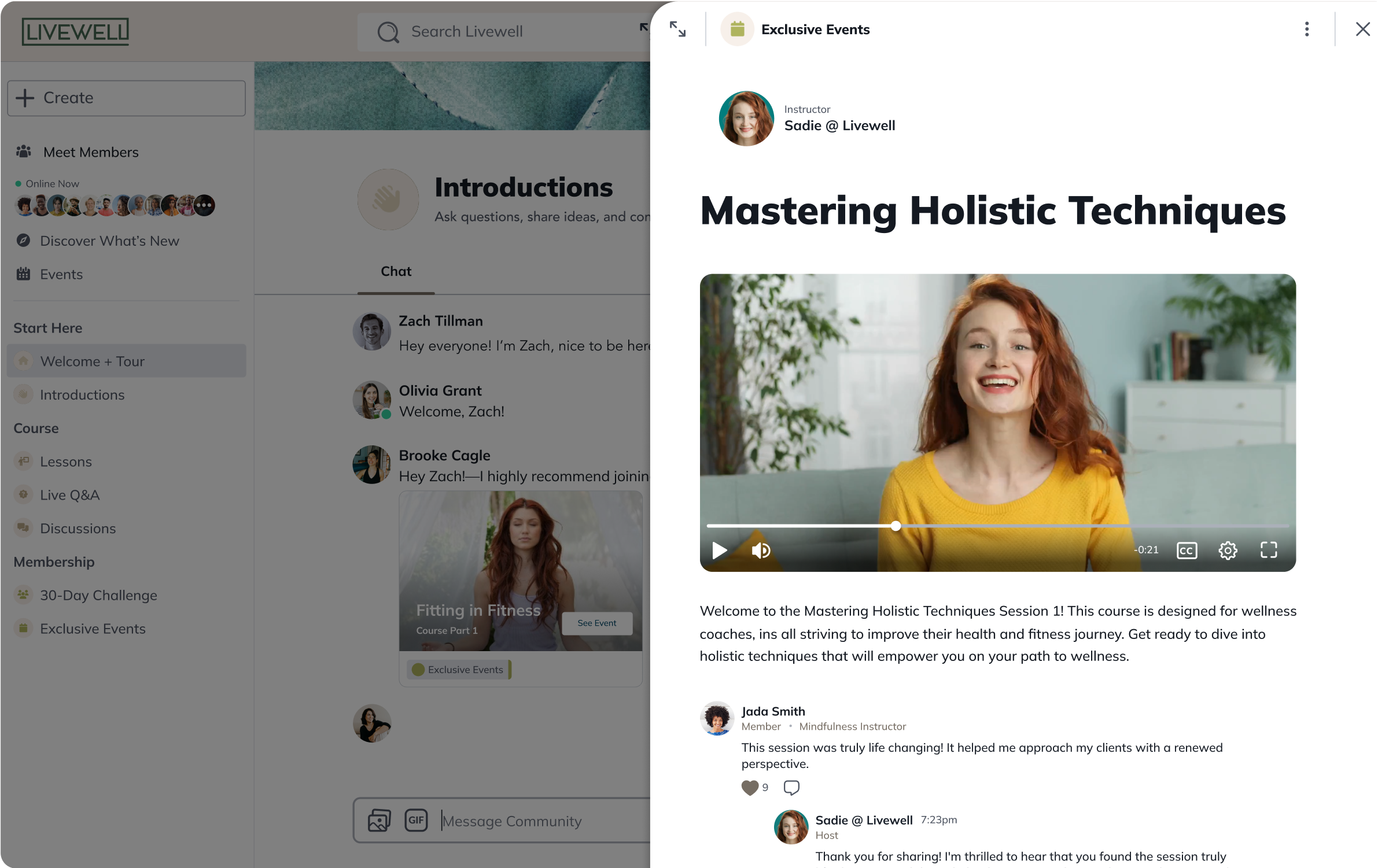
Here are some of the benefits of online coaching:
- Coaches can attract more clients because they aren’t limited to being in the same town/city.
- Coaches can provide their services from anywhere — from the comfort of their home to a coffee shop.
- A coaching niche can be more viable if you're pulling from a bigger pool (e.g. you might not have enough people in your town to fit your niche).
- Having more niched and specialized services can create a more profitible coaching business.
- There’s minimal investment — coaches only need good WiFi and a reliable device.
- Coaches can integrate additional content into their service by using a purpose-built coaching platform .
- Coaches can scale the value and services they bring their clients--including different delivery forms like productized services or group coaching.
Try our coaching business name generator !

What makes a successful coaching business?
- A niche: Generalist coaches can build businesses, but one of the quickest routes to success is to choose an in-demand niche and master it.
- Expertise: This can mean different things, but a good coach does need some level of expertise: through training or lived experience. Some coaches will also choose to have qualifications and certificates to boost their credibility (e.g. ICF Certification ).
- A value proposition: People hire coaches because of a transformation they want to experience. If you can provide this, you've got the basics of success.
- Coaching skills: Successful coaches aren't all the same, but do have a set of coaching skills: things like active listening, asking good questions, and critical problem solving.
- An acquisition channel: Word of mouth can be enough to grow a coaching business, but most coaches will have other strategies to acquire clients, from ads to being active on social media to getting listed in directories.
- Testimonials and reviews: These help reassure potential clients and reduce friction. Nobody has these when they start, so don't sweat it if you don't yet. As you land your first clients, be proactive about acquiring testimonials and reviews.
- Scale: Many successful coaches also scale into different offerings, like courses , events , or group coaching .
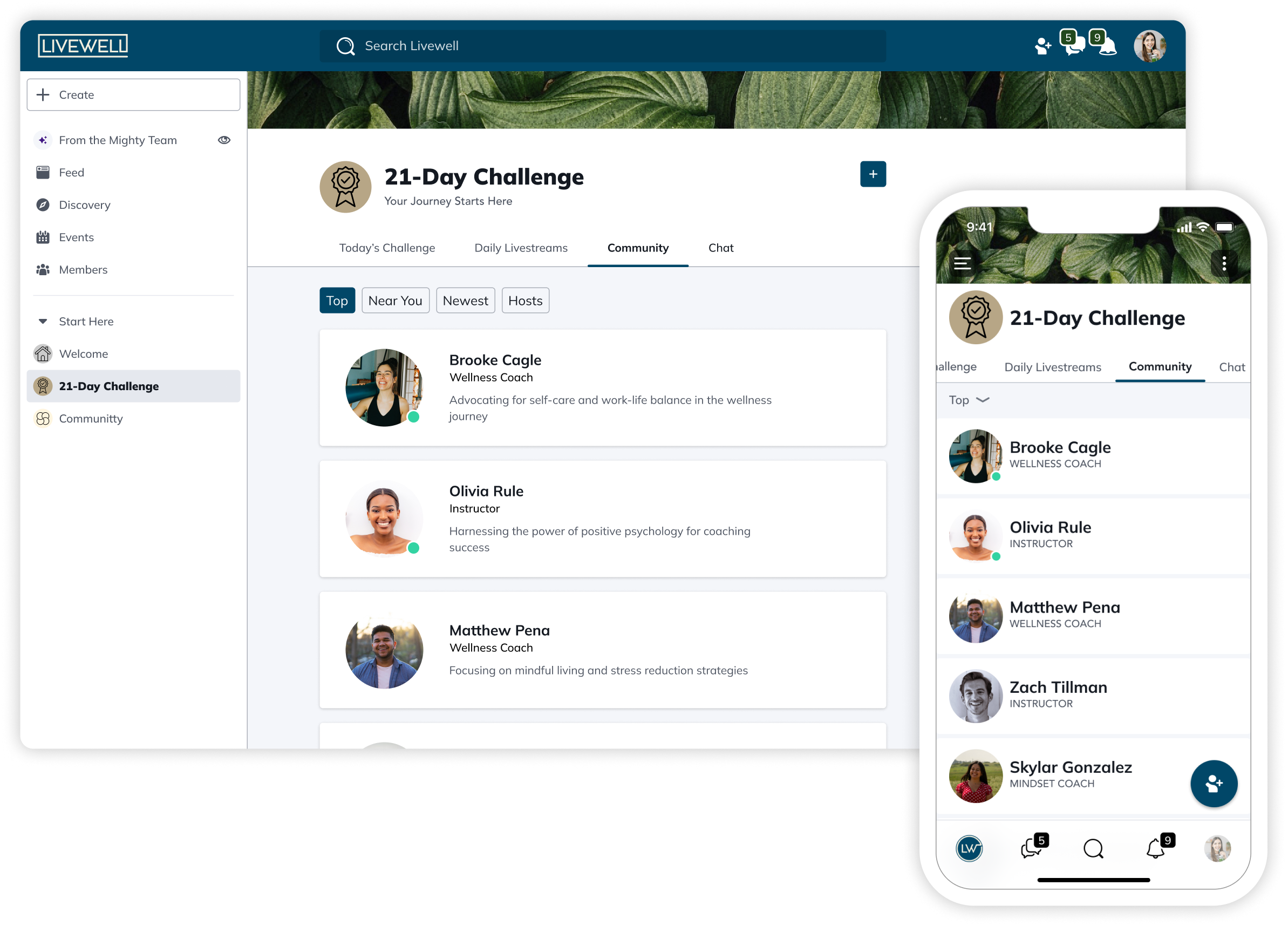
1:1 Coaching vs. group coaching
When considering how to build your coaching business, there's a question that most people have--should you do 1:1 or group coaching?
There's no one answer. It probably depends on your preferences as a coach, the preferences of your ideal clients (below), and which model better fits a coaching subject. For example, coaching people to master job interviews can be great in a group. But some subjects are so personal that 1:1 might be a better fit.
1:1 Coaching
The biggest benefit to 1:1 coaching is that you can meet your clients’ needs in a focused and private setting.
- There's more privacy and you can go deeper on issues than you might with group coaching.
- Some clients prefer focused attention.
- You can spend more time with each client.
The downsides of 1:1 coaching is that it can take up more of your time (more time spent sharing your knowledge, offering solutions, and listening). In order for 1:1 to be cost-effective, you’ll have to charge higher rates compared to group coaching. This business model also takes longer to scale.
Group coaching

If you’re more interested in building a community and facilitating sessions with multiple clients at once, group coaching is the path for you. Group coaching can be just as effective or even more so than 1:1 coaching, especially if you have members who all share a similar set of challenges.
- It can foster radical honesty and vulnerability. When members open up about challenges they’re facing, it encourages others to do so.
- It helps people know their struggles are normal.
- Members help keep one another accountable--challenging members to take steps and asking how it went.
- Serve more members at once.
Unlike 1:1 coaching, group coaching is much easier to scale, meaning you grow your business more quickly in less time.
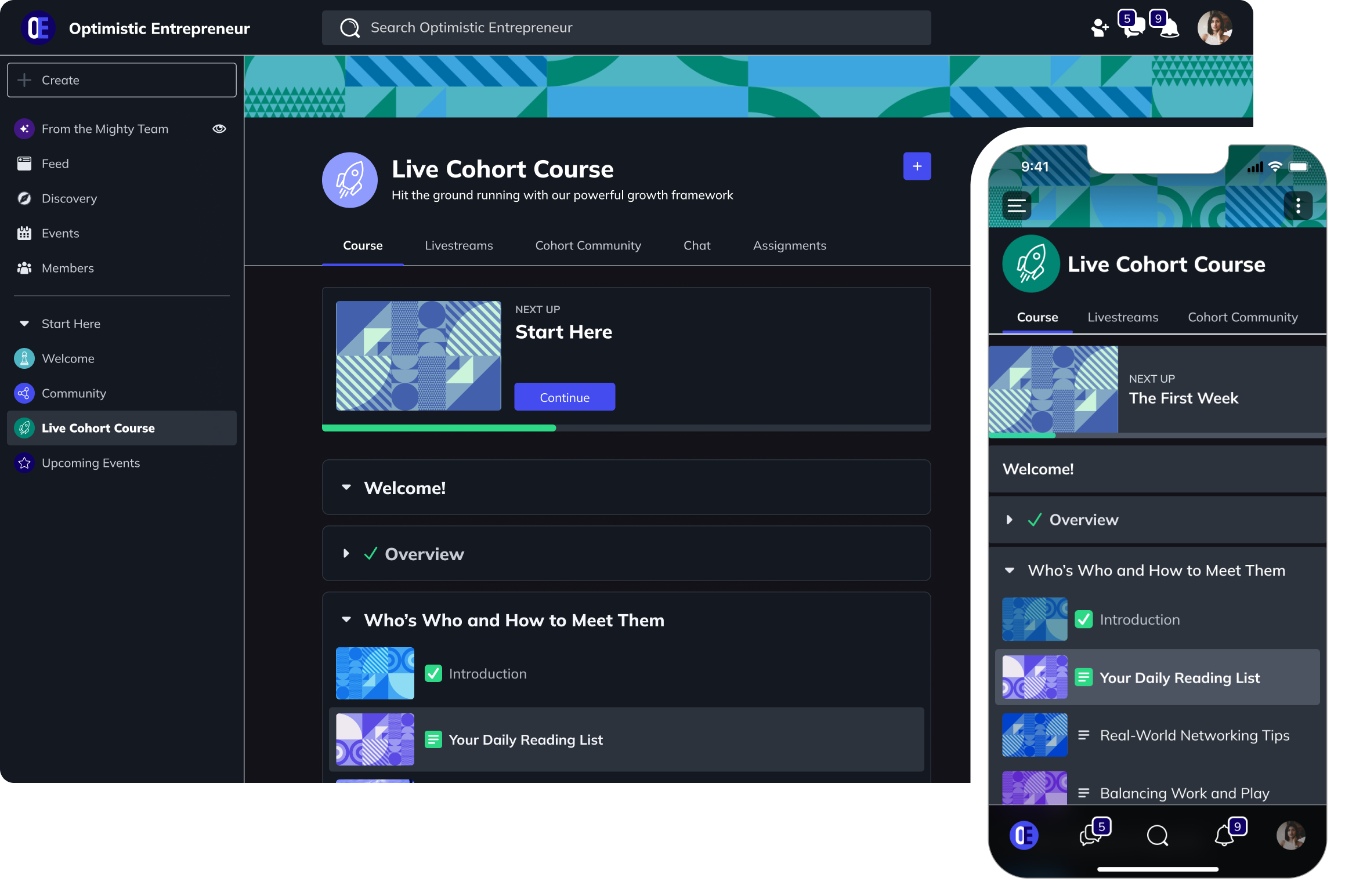
The challenge with group coaching is that you have less time with each client (sometimes you won’t get the full picture of their situation in the first few sessions).
Working with a group also requires a higher level of emotional intelligence (EQ) because you’re working with a variety of individuals who have different personalities and perspectives. You’ll have some clients who actively participate, and volunteer to share their point of view, while other clients are fine just observing and don’t always feel comfortable sharing.
That’s why it’s your job as a coach and the group facilitator to moderate discussions, make note of who participates, and pick clients who will make your coaching community thrive . Your ideal clients will be people with similar experiences, who are willing to talk about these experiences during a group coaching session where you provide a safe and non-judgemental environment.
You need to help everyone find common ground and make sure that each member achieves their goals by overcoming their personal challenges — which is no easy feat!
How to start an online coaching business (8 steps)
1. find your unique value proposition.
While coaching involves helping others, you can start from yourself.
Take stock of your core competencies and ask yourself important questions.
- What do you do better than most people you know?
- What area do you have lots of experience in?
- What do people ask you about?
- What have you learned that you could help someone with?
- Do you need additional qualifications and certifications?
- Do people pay for coaching in your area of expertise?
Maybe you’ve spent years working in a particular industry like Aliza Licht, who worked in fashion, creating popular social brand personalities. Now she uses her experience as a successful entrepreneur to provide career advice and new insights for young working professionals.
Basically, figuring out your focus as a coach involves knowing what areas of expertise you’re qualified to help others in combined with what you’re passionate about.
This leads us to who you want to coach…
2. Identify your ideal clients
As with any business, you want to hone in on who your ideal clients are . Since you have expertise in one area, it would be difficult to appeal to everyone.
That’s ok, because that’s the beauty of coaching — there’s a coach out there for every type of person.
Look at these examples of online coaching businesses:
- Helping single dads get back in the dating game
- Helping IT consultants get more contracts
- Helping millennials who are first-time bosses transition to leaders
- Helping CEOs craft their thought leadership on LinkedIn
There are all specific coaching business with a clear ideal client.
With a crystal clear ideal client, you'll better understand how you can help them, what they need from you, and how to attract new clients.
What does your ideal client look like? Be clear about what their pain points are, their experiences, what stage of life they’re at, and what they want to achieve. You want these people to see your services and think, “That’s what I need!”
Interview potential clients
The best market research is potential client interviews. Set up interviews with potential clients to find out their pain points, goals, and learning styles.
Keep an open mind here and listen well. These interviews aren't just about finding ways to sell things to the people you think are ideal clients. It's also about validating both your niche and your idea.
If you get positive feedback and see a need, move forward.
3. Develop a coaching program
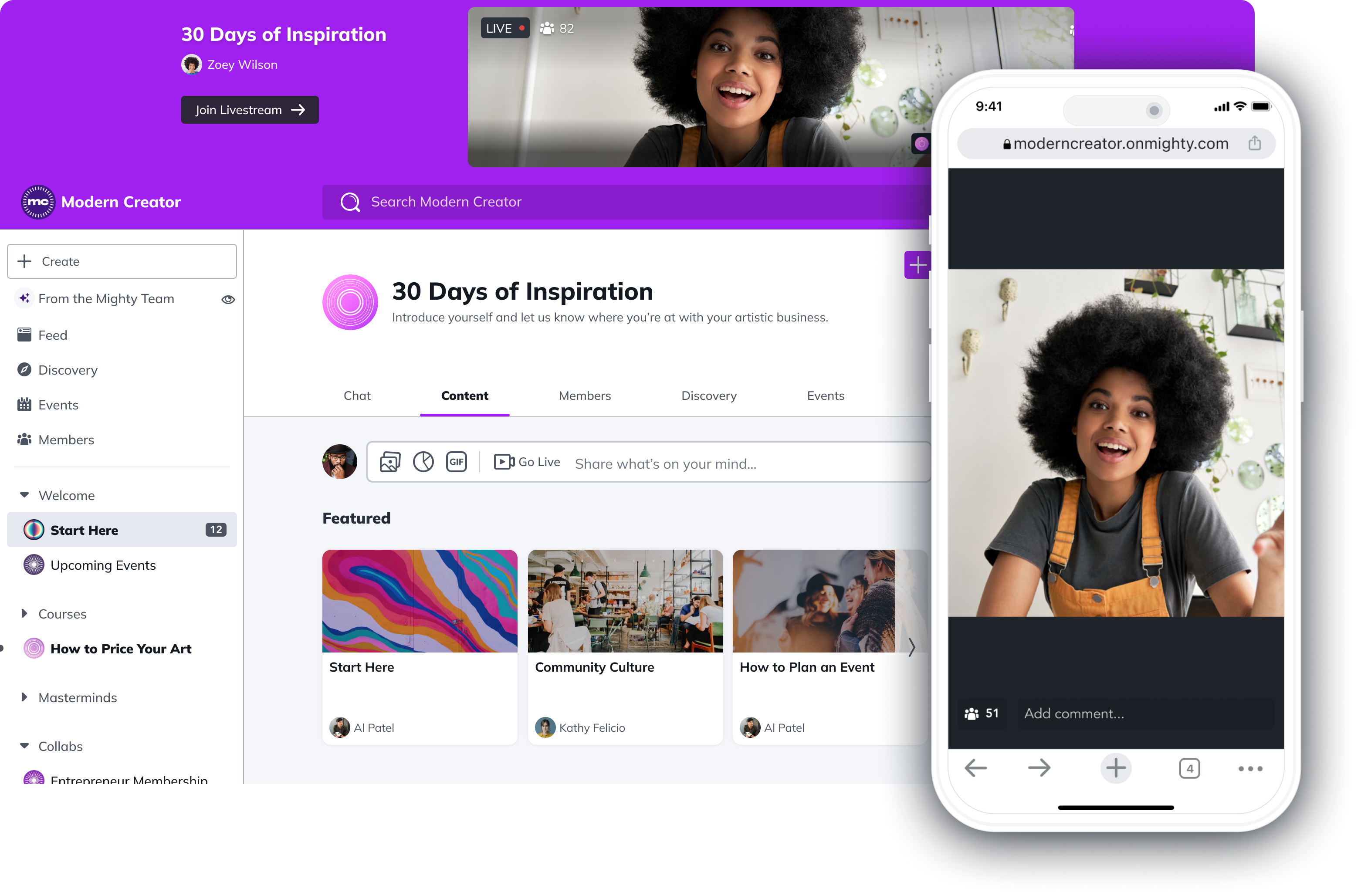
With your ideal client in your mind, it's time to design the program that will get them to transform.
Who will they be a year from now because they did your coaching program? What will they have accomplished? Set program goals, and then lay out clear steps to help them get to those goals.
Your coaching program needs to involve clear steps and structure.
Example: "Launch a tech career in 6 months"
Let’s say you’re a career coach who helps unfulfilled and underpaid employees transition into better careers in the tech industry over a six-month period. You've got a clear promise in your coaching package, plus a time-frame to help them reach their goals.
You'd need laser focus on what sessions your clients need to move the needle, and actionable items after each session to make sure they'll see results. It could look like this
- Session 1: Networking and exploring paths
- Session 2: Landing your first interview
- Session 3: Acing the interview
- Session 4: Salary negotiation and professional development
Community Design™ can help
When creating a Mighty Network, we teach a process we call Community Design™ , and part of the process is developing a Big Purpose statement , which looks like this:
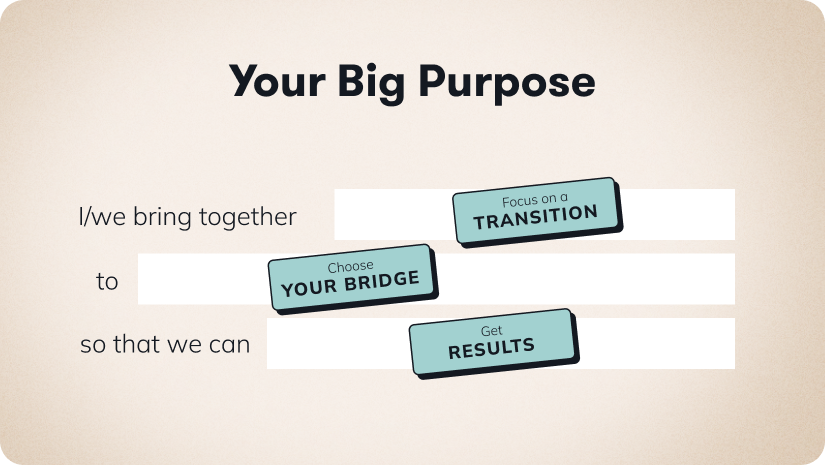
We do this for building communities, but whether you're building a coaching community or not--the steps are great to walk through.
4. Set the price
You could run a masterclass on setting pricing for coaching packages. But here's a simple hack.
Rookie coaches look at themselves to set their pricing. They ask:
- How much am I worth?
- How much do I know?
- How much can I feel good about?
Veteran coaches look at the client. They ask:
- How much is this knowledge and transformation worth to them ?
- How much value will they get out of this?
- How much to they need to pay to take this serously?
- How much can they afford?
And do your research on what comparitive packages go for. Ask other coaches in your niche or simply scour the Internet to find your answer.
A good rule of thumb is to price your services high enough that your clients will value your work but low enough that your ideal clients can afford you — find the sweet spot.
But this is a very different number--depending on your clients. Unemployed job seekers may value a coach, but can only afford to pay a certain amount. For an executive, that same amount is probably too small.
There may be some trial and error when it comes to figuring out your rate, but you’ll quickly know what makes sense and adjust accordingly.
Something else to keep in mind is that you should require a minimum commitment from your clients. Maybe you offer package deals but the minimum package is four coaching sessions. This will give you enough time to get to know them, help them with their challenges, and show them your value, keeping them coming back for more.
5. Choose a platform
Delivering online coaching requires tech. There's no way around that. So pick a platform that makes sense for your online coaching business. Whether you want to do 1:1 coaching or build a community for group coaching, your platform should have all the features that make your online coaching business a success.
At the bare minimum you’ll need a platform where you can host scheduled video conference sessions. A good online coaching platform will also let you offer free trials, bundles, discounts, and anything else related to sales.
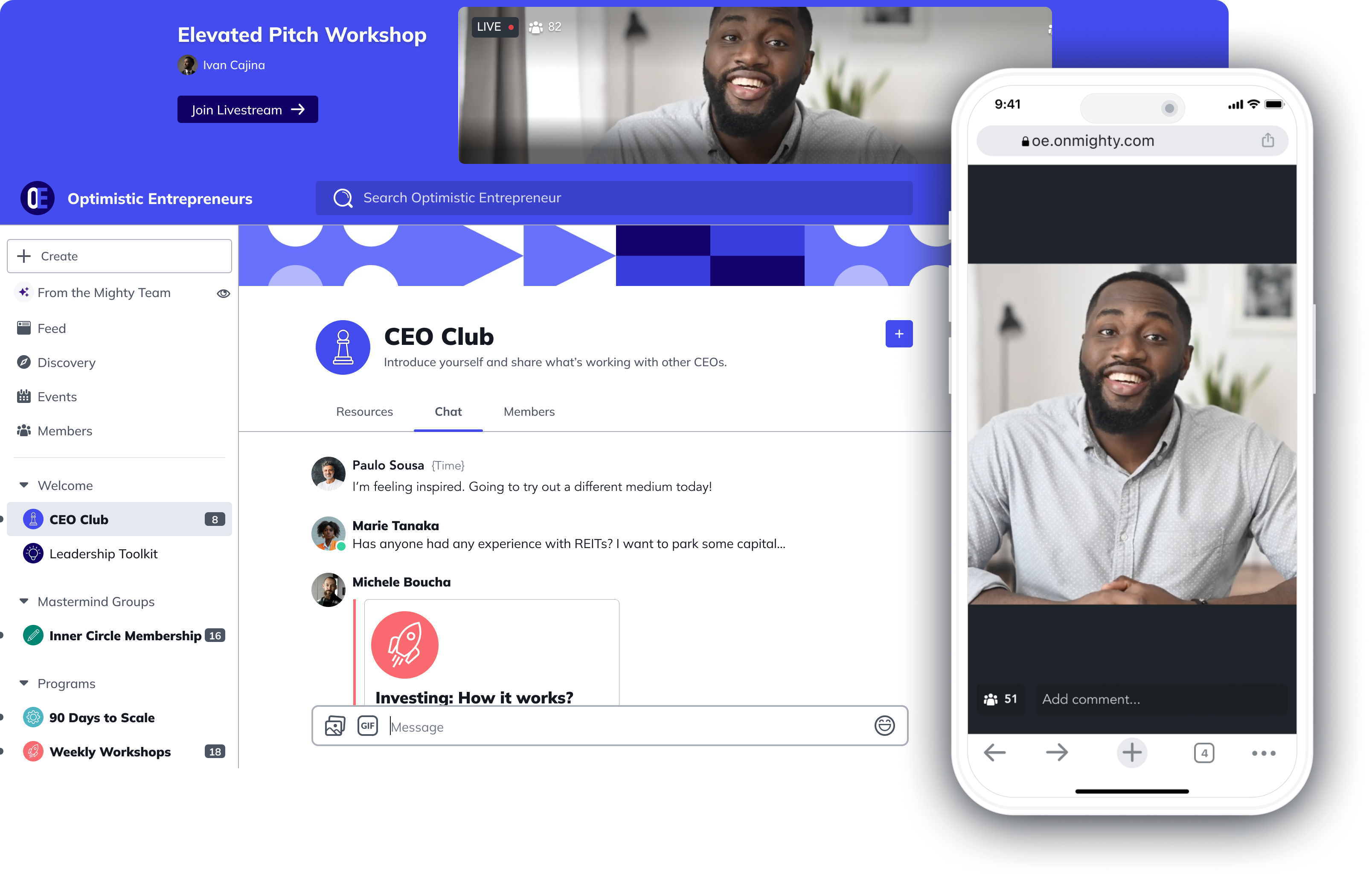
Even if you prioritize 1:1 coaching, consider building a community out of your interested clients. You might be surprised what connections emerge, and if you decide to pivot into group coaching, you’ll have a ready-made audience. Look for a community platform that’s designed to make engaging easy.
Features such as public forums for posting and live streaming , direct and group messaging, and video hosting will be essential to encourage interaction and connection amongst members.
Or, you could choose a platform to help you build beautiful, engaging courses . Courses are great additional resources for your clients or they can be tied right into your coaching program. They allow you to have more of an impact and can be used to scale your business (e.g. offering your courses separately from your program and charging an additional fee for members to access them).
6. Build and test
As with any business, you want to test it out before you launch it. Even if you have done in-person coaching, it’s a good idea to test out your online coaching business on a few clients. Make sure your internet connection is good, the transformative journey you take your clients on makes sense, and you’re familiar with the platform.
This is where you can iron out any kinks and get feedback. Testers who have benefited from your coaching services will be happy to provide a testimonial, which you can use for marketing purposes.
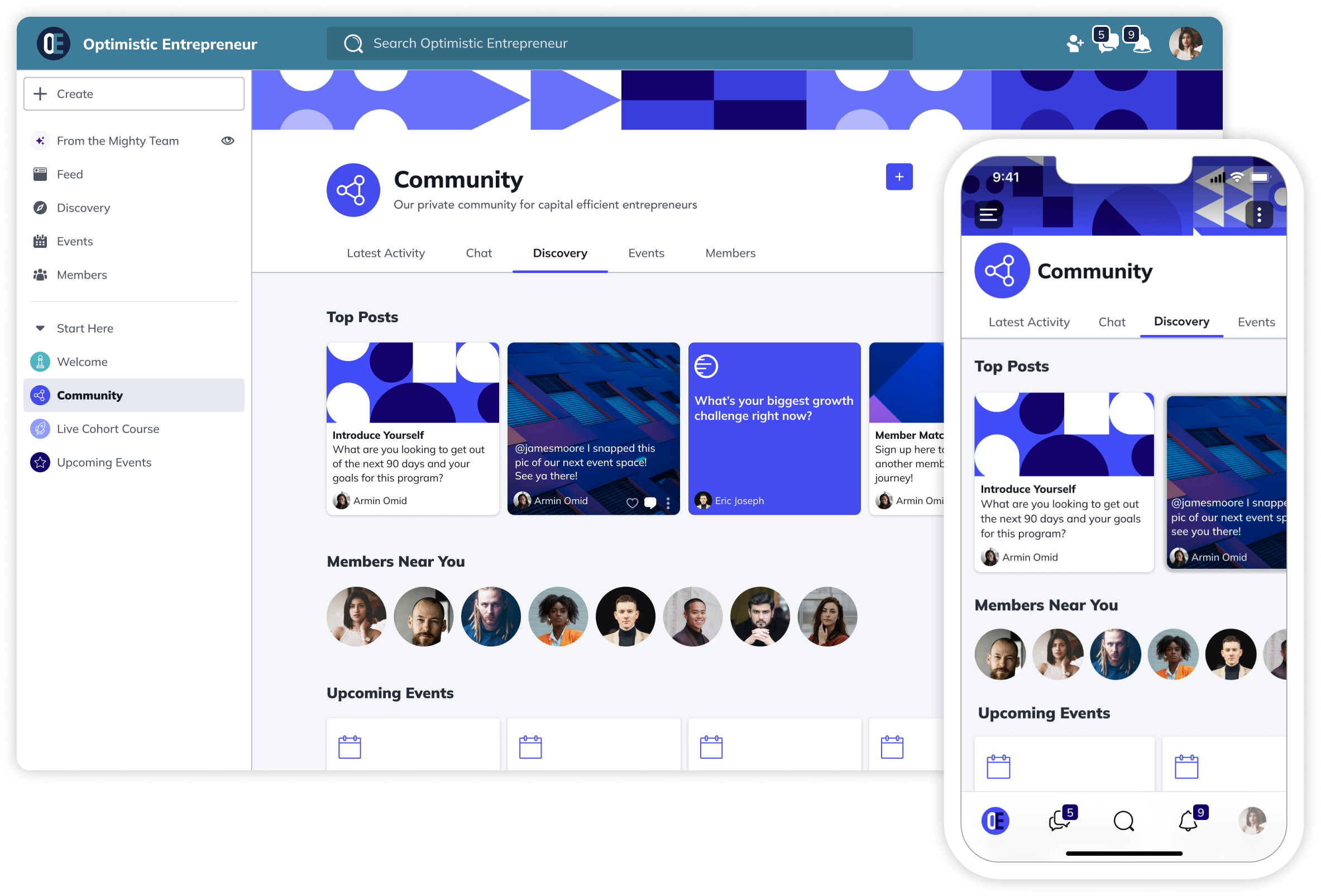
7. Build your pipeline
Just like any business, most coaches need to spend some time attracting ideal clients . What’s important here is to stand out from the sea of other coaches. Remember to highlight what makes you unique by accurately describing your services and showcasing your strengths, credentials, and experience. And lead with your story... that's powerful.
Here are some marketing strategies you can implement to attract new clients:
- Use social media: Choose social channels that make sense for your business and where your ideal client is likely to hang out the most (e.g. Facebook, Twitter, LinkedIn, Instagram, even TikTok depending on the type of content and age of the target audience). Make sure to engage with content as well, don’t just post and expect others to like your stuff. But there's a lot of noise on social. Don't be surprised if you don't get an explosion of clients just from posting regularly.
- Consider ads: Although not free (and sometimes not cheap), ads might make sense for your business. It’s a good way to get in front of a new audience and may generate a high return on investment (ROI) for you.
- Integrate email: Email marketing can be a solid client acquisition strategy--since 99% of email users check their inbox daily. So give value in people's inbox. For example, if you’re a nutrition coach, you can provide five examples of healthy snacks to prepare on the fly. Each week you can provide a new tip with a call to action (CTA) to sign up for your coaching program.
- Create more value: A common marketing strategy is to create additional resources, like an ebook or infographic. This strategy is to establish yourself as an expert and show that you're capable of offering value.
- Use testimonials: They're powerful. to back up your claims and prove your legitimacy. 70% of any shoppers online read reviews first. That's why testimonials can be a really valuable selling tool.
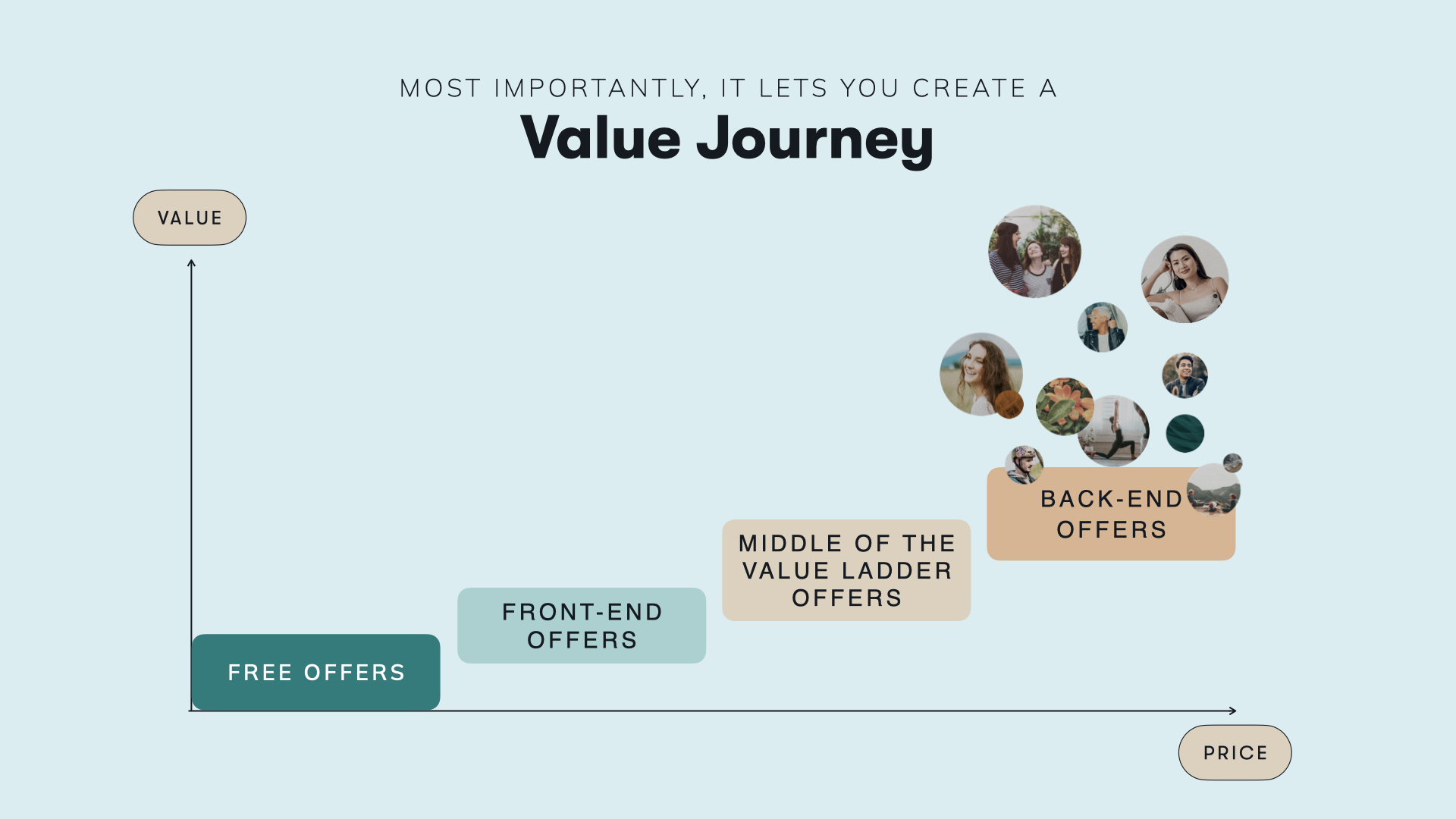
8. Deliver (And keep delivering)
Finally, deliver your coaching package to the very best of your ability to your ideal clients. And when it's done, look at what worked and what didn't, then run it again.
Thanks to online marketing, many coaches have the idea that they need to make $20k in their opening weekend to be a success. That's not true at all. Keep growing, learning, and improving. Thriving digital businesses take time to grow, just like bricks and mortar ones.
Here are ways to improve:
- Check in with your clients to see if they reached their goals.
- Ask for feedback (as well as testimonials).
- Check your analytics to see what worked and where clients spent time (especially with a recorded coaching program).
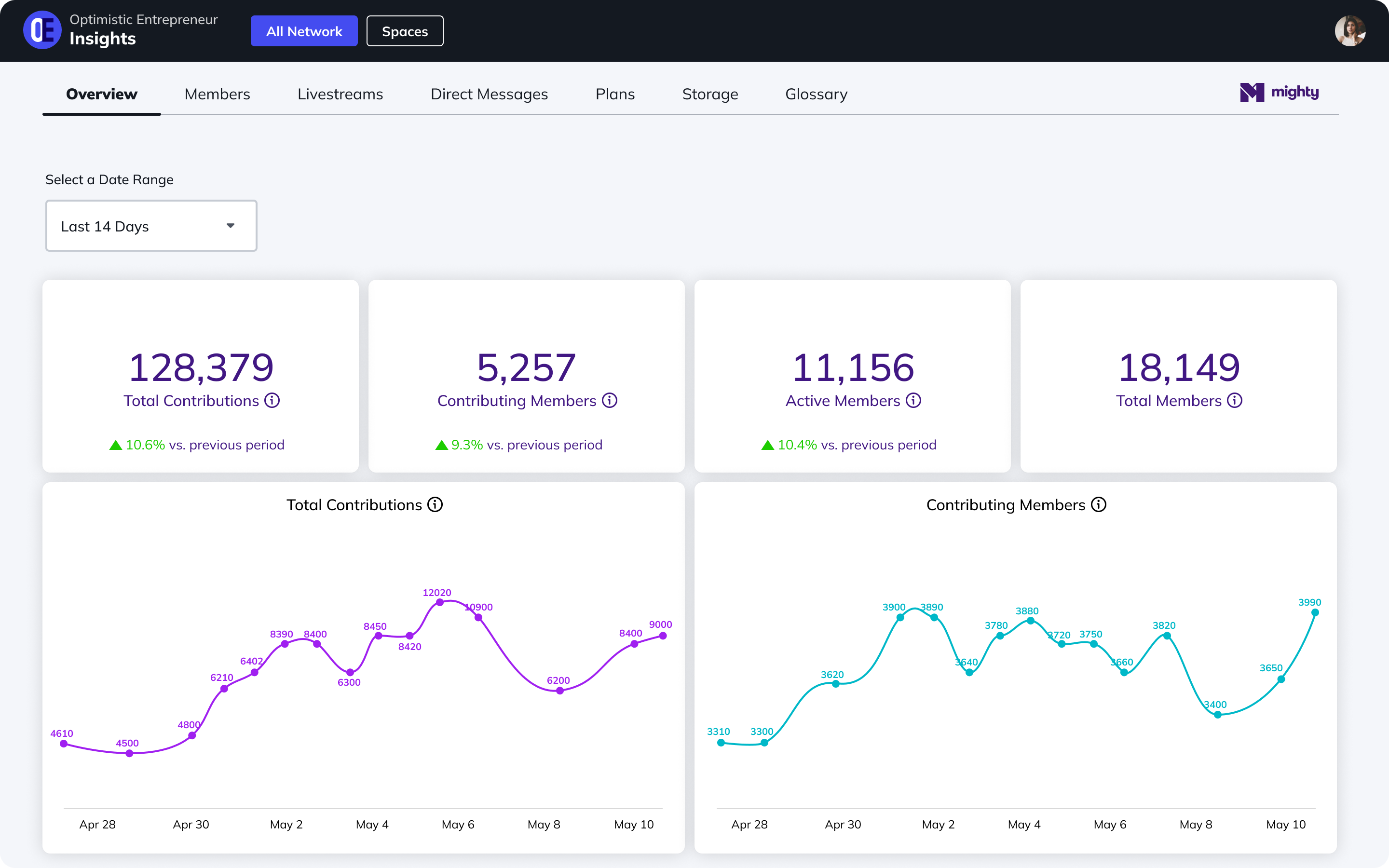
Whether you prefer coaching 1:1 or in a group, there’s a lot that goes into building an online coaching business. If you thoughtfully plan it out, from understanding who your ideal clients are to attracting the right ones, you’ll have a successful business that you can run from anywhere.
If you're looking for coaching software that gives you everything you need for your online coaching business: including the power to build programs, deliver sessions, host virtual events and livestream, and build a coaching community (if you want to), come build with Mighty!
Our powerful platform is designed to help you grow your online coaching business and community. And you can try it free for 14 days--no credit card required.
Ready to start building your community?
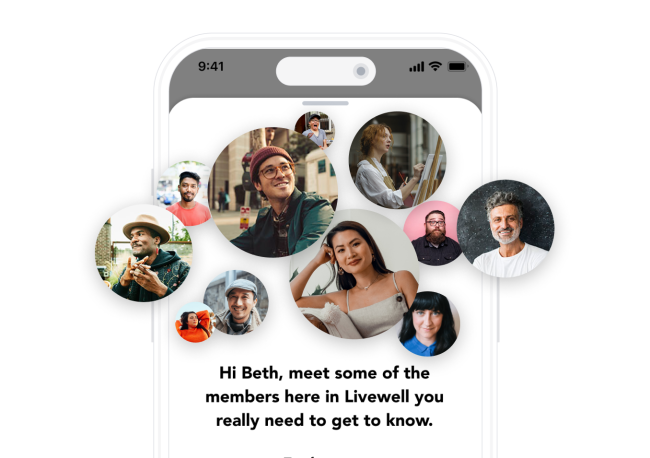
MORE LIKE THIS

Content Alone Will Kill the Creator Economy

Patreon vs. Mighty Networks - Which Is Better in 2025?

What Is Passive Income? All You Need to Know for 2025

Here’s How to Monetize a Podcast in 2025 (5 Options)

How to Monetize a YouTube Channel Like a Pro in 2025

Our 2025 Guide to Recurring Revenue (+10 Business Ideas You'll LOVE)

Our Guide to Bootstrapping Your Business in 2025

5 Ways to Monetize Your Audience in 2025

What Is a Digital Nomad? A Complete Guide + Career Options (2025)

What Is a Paywall? Everything You Need to Know for 2025

How to Connect Patreon to Discord (+ The Best Alternative)

14 Scalable Business Ideas for 2025

The Ultimate Guide to the Creator Economy

10 Video Monetization Platforms (+ How to Monetize)

6 Repeat Business Ideas to Rock 2025

How to Make Money Selling Digital Products (+45 Digital Products to Sell)

Here’s Where to Sell Digital Products (18 Options for 2025)

What Are Digital Goods? Beginners Guide + Examples

Monetize. Monetization. How It Works + Examples (2025)

A Beginner's Guide to Digital Products
Join mighty community.
Learn the principles of Community Design™ (and see them in action) alongside thousands of creators and entrepreneurs. It's free to join!

Build a $1M Community in 9 SIMPLE STEPS. This free masterclass went viral—sign up to learn why
FEATURES & PRICING
Features Overview
Online Courses
Automations
Move to Mighty
About Mighty Pro
Pro Case Studies
EDUCATION & TOOLS
Case Studies
Encyclopedia
Resource Center
Creator Calculator
New Creator Manifesto
COMMUNITY & SUPPORT
Mighty Community
Find a Mighty Network
Mighty Spotlight


- Certifications
- Find A Coach
Free Masterclass! 4 Simple Steps To Start Your Coaching Business Today
The ultimate guide to mapping out a rock-solid coaching business plan.
The 5-Step Roadmap To Create A Highly Profitable Coaching Business Plan Even If You're A New Coach

What's the first word that comes to mind when you see the word "coach" or "coaching"?
If you're a coach - and it doesn't matter whether you're just starting out or whether you've been coaching for decades - there's a high possibility that the words coach or coaching brings to mind things like:

These are all amazing elements of coaching and they're a big part of what you do as a coach and why you're a coach, but there's a word that's missing from that list...
It's the one word that's the difference between a successful coach who can create a ripple effect of positive transformation for hundreds - maybe even thousands or millions - of people and a coach who remains unknown, unseen, and unheard.
So, what's this mysterious word?
The word is BUSINESS.
There's a popular viewpoint in the coaching industry that when you serve with passion, and when you serve from the heart, clients will appear and your business will magically start to grow.
It's like that famous line from the movie Field of Dreams , "Build it and they will come..."
That sounds great in a movie but when it comes to the real world, it's a total lie!
Thinking you can become a successful coach if you put enough heart and passion into your work is one of the most dangerous and flawed beliefs out there...
And it's time to bury that belief for good.
The truth is the fastest, smartest way to become a successful, profitable coach is to create a strategic path for your practice with an awesome coaching business plan.

This Guide will take you through the exact steps you need to map out a rock-solid plan for your coaching business.
The best part? It works no matter where you are in your journey as a coach and unlike traditional business plans that can feel super intimidating and complicated unless you have a degree in business, this one is incredibly simple and absolutely effective.
Remember...
Coaching is a business.
The sooner you understand this fundamental truth, the faster you'll rise up along a profitable, purposeful path that allows you to serve more people and change more lives.
Ready to get started? Let's roll!
The 5-Step Coaching Business Plan
Creating your rock-solid coaching business plan , how to build a successful coaching business.
Ever heard of "Shiny Object Syndrome?" It's something a lot of smart, gifted entrepreneurs struggle with...
It's when you're distracted and sidetracked by countless creative ideas or exciting opportunities that you just can't seem to ignore.

Imagine this...
You have a great idea for an online coaching course around your niche or area of expertise as a coach and you start brainstorming and writing content for the course.
You're deep into your work and just as you're gaining momentum, a great coach you know - maybe someone you met in an online community or live networking event - reaches out to you.
Turns out, they have a great partnership or affiliation opportunity and they think it's perfect for you.
You're instantly struck by Shiny Object Syndrome. You abandon your course creation path and start chasing down this new opportunity with this coach.
A few days - or maybe even hours - later, you're hit with another idea. So you drop everything and start going at that new idea. And then, another idea pops up. And another and another...
What if you start an online coaching membership ? Maybe you should write a book ? Maybe you should build out a year-long mastermind program? Or start organizing retreats and seminars?
And on and on it goes.
Pretty soon, you've raced down a hundred different rabbit holes, but you have zero results to show for it in your business!
So, let's get one thing straight right here, right now...
Shiny Object Syndrome is a fast-track to failure. A great business plan is the exact opposite.
A coaching business plan gives you immunity. It protects you from having to chase one good idea after the next because you already know what your business needs and you'll instantly reduce the uncertainty of how you're going to create revenue.
Think about it...
When you've mapped out a solid business plan and you know how you're going to make money in your coaching practice, you can actually start to predict how much money you're going to make each week, each month and each year.

You can even do this exercise in reverse and create a business plan based on your financial goals and how much income you want to make. So, you set the goal first and then reverse plan to meet that number.
With an awesome business plan in place, you'll be able to direct your energy to the tasks, projects, ideas, opportunities that will work to grow a thriving, sustainable coaching business that brings you satisfaction and a reliable income.
It will give you a clear roadmap of what you need to focus on and how to manage your time better. It will also give you a sense of security to know you will reach your financial goals if you stick to the plan.
Throughout the rest of this Guide, you'll learn the 5 steps to building an awesome coaching business plan that works for you to achieve the goals you desire.
The 5 steps or 5 Cs are:

Conversation

Before we get started on step 1 in the next chapter, let's kickoff with "secret step 0" in the Take Action section below to set the stage.
This is where you identify distractions and take an honest look at your mindset so you can easily create laser focus around building an awesome business plan and an extraordinary coaching business that stands the test of time.

A journey of a thousand miles begins with a single step.
That's an old Chinese proverb.
Your single step right now is to do a personal mindset check in and tune up.
Answer the following questions with 100% honesty so you'll be all set to take action and start creating a kicka$$ business plan as you move through upcoming chapters in this Guide.
Question #1
What are your current ideas around growing your coaching business ? This could be things like starting a membership site, building out a group program or anything else that comes to mind.
Note: Writing down your ideas will get them out of your head and help you pick a path that feels good to you as you start to create your business plan in the following chapters.
Question #2
Write down the names of people or places (online and offline) that have the power to distract you from tasks and projects in your business. This could be a good friend who loves to spontaneously invite you out for coffee, it could be endlessly scrolling through Facebook or Instagram or any other social media platform. List as many as you need to.
Note: This helps you identify your weak spots or triggers to "Shiny Object Syndrome" that take you away from the focus and energy you need to build your business based on a clear plan.
Question #3
What are your minimum, mid-range, and "out-of-this-world-awesome" financial goals for your coaching business each month and each year, for the next 3 years? You should also list out 1 to 3 dream gifts you will give yourself - travel around the world, purchase your fantasy home, make a generous donation to your favorite charity - when you hit each of your financial milestones.
Note: These milestone numbers will give you in depth clarity and unshakeable motivation to build a successful coaching business that lets you live the life you want while doing the work you love.
Make The Leap
How to start an online coaching business (ultimate guide).
Here’s everything you need to know to become an online coach and build a profitable and sustainable coaching business.
Whether you have worked as a coach already or are looking to dive right into it, online coaching offers up plenty of benefits for both you and your potential future clients. The best part is? No specialization needed! You can launch an online coaching business within any niche.
You can work with clients worldwide, be flexible with your hours, and get started with as little as a laptop and internet connection.
That said, while starting an online coaching program is simple, the job itself isn’t always easy. At the very least, you’ll need an in-demand idea that you have the skills to realize. Plus, finding new clients and scaling your business can be just as challenging online as it is in the offline world.
In this guide we cover everything you need to know to coach online, from writing a business plan to growing your audience.
Know exactly what you’re looking for? Jump to it here!
- Why start an online coaching business?
- 8 steps to launch an online coaching business
- Frequently asked questions
Why start an online coaching business?
As Simon Sinek said in his seminal book Start With Why (and his popular TED talk ), “People don’t buy what you do, they buy why you do it.”
It’s a good practice to ask yourself first: Why do you want to offer coaching services online?
While everyone is going to have their own unique reason, there are also plenty of universal benefits to running coaching programs on the web.
It’s profitable
Virtual programs allow you to spend more time with your clients rather than commuting around, meaning you can fit more clients into your schedule. Every session equals more revenue.
It’s more scalable than in-person coaching
Group coaching classes become accessible and easy to launch, so you can accommodate more people at more times. You’ll also leverage online coaching platforms that automate many of your everyday tasks like meeting scheduling and content distribution to save even more time.
You can coach clients from around the world
Delivering coaching sessions online allows you to tap into markets with the highest levels of consumer spending internationally, outside of just your local community. The countries with the highest number of learners include the United States, India, Mexico, Brazil, and China.
It can generate passive income
You can turn your expertise into on-demand coaching programs that thousands of people can take and pay for on their own time. You can do the work once, record yourself while doing it, and then earn passive income by selling it as a course for as long as the course is active online.
The cost to acquire new leads is significantly less
Many coaches rely on paid ads and in-person events to generate a high volume of leads quickly. Or, they route for word of mouth referral services that are slow to generate leads. Online coaching provides more marketing opportunities for scalable, affordable lead generation.
The demand for online coaching services is high
As the nature of our work changes faster than ever before, education and learning online have become increasingly important. This means the demand for coaching has grown too. Online coaching is expected to be an $11.7 billion market by 2032 !
You can leverage thought leadership for skeptical buyers
With in-person offerings, you’re limited to the brochures at the front desk. And those only appeal to people that have actually stepped foot in your office. Taking a virtual approach gives you more educational opportunities to show off your abilities via socials or websites. This helps build trust with otherwise skeptical leads.
How to start an online coaching business: 8 steps
Regardless of what type of coach you want to be, you can follow the same eight steps to create a successful online coaching business. The key here is to plan in advance and have a strategy mapped out before you dive into execution.
Work on your coaching skills
All online coaches, from business coaches to health coaches, essentially use the same set of coaching tools and rely on their core competencies to set them apart. Janelle Scott, P. Eng shared that there are 6 elements that combine together to create “coaching excellence” including:
- Foundational knowledge and training
- Deliberate, focused practice
- Natural empathy and emotional intelligence
- Lived experiences and overcome challenges
- Continuous learning and adaptation
- Regular reflection and refinement
Start by assessing your area of expertise and your unique specialization (e.g. online fitness coach vs. online bodybuilding coach). Ask yourself how your skillset can be improved.
Soft skills are an important part of emotional intelligence, reflection, and growth. Here are a few that you should prioritize practicing for your coaching sessions:
- Being empathetic
- Knowing how to listen
- Staying calm in stressful situations
- Recognizing your biases
- Offering emotional support
- Seeing client’s potential
- Inspiring confidence
For more information, read our previous article on 6 proven methods for improving your coaching skills.
Draft up a business plan
Even if coaching is not your primary occupation and you’re just working on it part-time in the evenings, you still need to have a business plan. Otherwise, how will you know what you’re working towards? How will you measure your progress?
First, you need to define your audience .
- Who are you trying to reach and why?
- Why do they need your service?
- How much are they willing to pay?
Second, research your niche.
- Who are your competitors?
- How are you different from them?
You can use this coaching business model canvas to map your unique value proposition, the way you make money, and how you deliver your coaching services.
Jennifer Kem , brand building expert and CEO of the Master Brand institute, recommends getting as specific as possible on the type of people your area of expertise serves.
“The more specific you are, the easier it is to identify what key areas you need to communicate to attract clients. An online fitness coach who specializes in helping people who were injured and are getting their health back on track is very different from someone who helps elite, amateur-level athletes increase their dynamic range of motion. Both are fitness coaches which means they cover the same concepts however in practice, these are two very different things. ” – Jennifer Kem, CEO of Master Brand Institute
Plan your coaching program
Once you have a business plan, you should create a coaching framework that will outline all the processes you will follow in your coaching practice.
To maximize your profits, you should consider two coaching styles for your framework:
- A scalable, on-demand, one-to-many group coaching online course presenting the fundamentals of what you know
- Exclusive, one-to-one, “executive” coaching sessions that are priced high and aimed at solving the unique problems of your select audience members
Tip: Don’t rush into pouring all of your knowledge into your first online course (or video). It’s more efficient and effective to deliver your coaching in smaller chunks. So instead of a two-hour masterclass, try multiple 10-minute segments .
Plan for customer loyalty
With your one-to-one coaching, it’s good to offer one or two trial sessions, and then require a minimum commitment (e.g. six or 12 coaching sessions) to lock in revenue and reduce churn .
A best practice that Jennifer Kem recommends is to sell the outline of your program then to build it out as you work with people. She believes if you do this with ten different clients, it’ll give you a thorough understanding of what clients need in order to find success.
Build your brand
There’s nothing more important at the beginning of your online coaching career than standing out. You need people to talk about you, and you have to give them a reason to do so.
Your market research will help you formulate a brand that appeals to the preferences of your target audience. But it should also display your personality and unique coaching approach. This helps leads and clients feel compelled more to your brand than any other because of specific connection points, like your history in the field or focus on client care for example.
With more information on the demand side of your business, you can position yourself and start building your brand in a way that speaks directly to your audience. Make sure that your brand is consistent and expressed the same way across all platforms, including your website, online courses, social media, and other marketing channels.
Your personal brand = consistency × standing out.
Set up your online coaching service
If you find yourself manually copy-pasting things and spending time on repetitive admin tasks, you probably just haven’t found the right tools to simplify your workflow.
Here are a few types and examples of online tools used by online life coaches, business coaches, personal training coaches, and others.
- Video conferencing platform . In the world of online coaching, you need a reliable video conferencing tool that syncs with your calendar, has chat, allows you to share your screen, exchange documents, record sessions, etc. This will help you make sure your day-to-day practice runs smoothly and you keep your clients on track. A few popular apps in this category are Google Meet (it’s free!) and Zoom .
- Online coaching or learner management platform. Based on your coaching framework, the other coaching channel you might need is an online learning platform that helps you create group coaching courses. Some key considerations here are price, ease of use and the ability to customize your platform (e.g. add your branding). Thinkific is an easy to use platform for building and marketing online courses. You don’t need any coding or tech skills to start using it & can get started in less than one day.
- Marketing channels. Think about the best way to connect with your audience. Are they using Twitter, Facebook, Instagram, LinkedIn, or email? Managing multiple social media channels can quickly become overwhelming, so you may want to use a centralized social media management app for scheduling posts and replying to comments, such as Buffer or Hootsuite .
- Mass communication channel. Email newsletters are also a great way to convert more followers into customers. You can ask your audience to sign up for email updates and then send them occasional supplemental materials or offer discounts to keep them engaged. Mailchimp is the leading tool in this space, perfect for anyone from personal trainers to online weight loss coaches.
Price your coaching program
Income is the main driver of your business.
When it comes to pricing your coaching sessions, do some research to find out the average rate in your niche. Then pick a number that’s 10–20% higher than that and use it as a benchmark for your pricing. If you find that the number you landed on is too high or too low, you can adjust your pricing strategy as you go.
Remember that you don’t charge customers to cover your costs — you charge customers based on the value you provide to them.
Find customers
Looking for quality clients is something you’ll continue to do for as long as you have your coaching practice. To get a steady flow of clients, you should think of your marketing in terms of a conversion funnel.
- Top of the funnel awareness building happens through social media posts, online ads, podcasts appearances, conference presentations, and other platforms where your audience remains passive. The goal is to educate about why online coaching is valuable.
- Middle of the funne l engagement and consideration tactics include sending email newsletters and distributing free materials (e.g. PDF ebooks in exchange for email address registration on your website) to educate your audience about different online coaching solutions.
- Bottom of the funnel is where conversions (a.k.a. sales) actually happen. It’s your online course demo and your free 30-minute online coaching consultation, at the end of which you direct your audience to make a purchase. Keep the focus on educating why your offering is better than anything else, for that specific buyer profile.
Always, always maintain reporting and optimization strategies to make the most value out of every campaign. Don’t be afraid to pivot early when something isn’t working.
Not enough new social media followers? Try appearing as a guest on someone’s podcast.
Not enough email subscribers? Write a new guide to share in exchange for email collection .

Collect feedback and improve
No process comes full circle if you don’t collect feedback to improve it.
First, you need a community of peers who you can discuss ongoing issues with and help each other resolve them. Try looking on LinkedIn, Reddit, Facebook Groups, or industry-specific slack channels.
Second, set up a feedback loop with your clients. Whether they take your courses or meet with you one-on-one, you can send them short and anonymous surveys to rate the quality of your content and suggest ideas for improvement.
Start your own online community if you have to. Host peers, mentees, or anyone who may be a positive contributor.
Make sure to set aside some time each week to review new feedback coming in and figure out how you can apply it to your work moving forward.
Starting an online coaching business: Frequently asked questions
Leveraging the information above, you can quickly start a real online coaching business. However, you might still have a few questions. Here are the answers to the most popular ones.
How much money do online coaches make?
Since online coaching is a service that cuts through multiple industries, the compensation varies a lot.
For example, an online bodybuilding coach might not spend as much time with you as they would in-person at the gym , so they might make less for actual coaching sessions but make up for it on custom programming.
Online business coaches, especially executive coaches, on the other hand, tend to make much more — on average, hundreds of dollars an hour. That’s because their coaching is tied to high-value transactions in the business as a direct result of your lessons .
Your rates would also depend on where most of your target audience lives. In the US, you can expect to charge at least $50 an hour. Multiply that by the number of hours worked, and you have your gross income.
Related: How Much Do Life Coaches Make?
How do I offer a coaching service online?
To be a professional coach online, all you need is a video conferencing tool (e.g. Zoom) and maybe a scheduling app (e.g. Calendly) that you can integrate into your website. For more, read our 2022 guide to essential online coaching tools and platforms.
It would also be handy to have a way to organize multiple learner’s programs and deliver digital learning content to them from one platform, like Thinkific.
How do I price my online coaching program?
The way you price your coaching services should correlate with the amount of value you provide (as perceived by the client). If you’re not sure about how to value your work yet, start with the industry average rate and add anywhere from 10-20% to test the waters.
How do I get more coaching clients?
By far, the best way to get new clients is through referrals from your existing happy clients or alumni. If you don’t get referrals organically, reach out and ask for them. Ask to be introduced to anyone who might benefit from your services — then sell your services to them!
If you’re brand new, don’t be shy of testing some digital marketing strategies. Scroll up to step #7 for some ideas.
How can I generate passive income as an online coach?
You only have so many hours in a day for one-to-one coaching. Eventually, you want to get to a point where most of your revenue comes from services that you don’t have to actively participate in every time.
Should I offer group coaching or one-on-one coaching?
This decision is entirely up to your preferences and what you see is generating the highest demand from your target audience. Start with one or the other, and add the second alternative after you have strong foundations with the first method. Keep in mind that your pricing and session structure should differ for each, with group sessions being more affordable and focused on teamwork activities.
What is the first step to get started as an online coach?
Online courses are a perfect way to build passive income from your coaching practice. Create your own online course using Thinkific today and see how easy it is to turn your knowledge into profit. Starting with Thinkific is fast and free. So challenge yourself to do something new that will pay off handsomely in the long run.
This blog was originally published in April 2022, it’s since been updated in November 2024 to include the newest information.
Colin is a Content Marketer at Thinkific, writing about everything from online entrepreneurship & course creation to digital marketing strategy.
Download this guide and start building your online program!
It is on its way to your inbox
- Business Success , Customer Acquisition , Digital Marketing , Guides , Marketing
- February 2, 2024
9 Things You Need to Launch an Online Coaching Business
In just under ten years, online coaching has grown rapidly, going from a market value of $2.19 billion in 2022 to an expected staggering $6.79 billion by 2031 . This remarkable surge highlights the increasing popularity and impact of online coaching in various domains.
Today, there is an incredible opportunity for aspiring coaches to build successful careers while making a transformative impact on their clients’ lives. The current climate is perfect for enterprising individuals looking to explore this lucrative profession. Whether your expertise lies in personal development, career guidance, health and wellness, or any other field, launching an online coaching business has never been more promising.
In this comprehensive guide, we will walk you through the critical stages of establishing your presence in the virtual coaching world. From validating your services and identifying your ideal clients to choosing a business model that ensures profitability, and, finally, strategies for launching and growing your own online coaching business, we’ll cover everything you need to know.
What is Online Coaching?
Online coaching harnesses the power of the internet to provide guidance and support, no matter where you are. Through video calls, audio chats, and messaging, coaches can offer personalized services that make a real impact.
The benefits are endless. With online coaching, you can reach a global audience and specialize in unique niches that may not be available locally. And the best part? Coaches have the freedom to work from anywhere—home, a coffee shop, or even while traveling! All you need is good WiFi and a reliable device.
Plus, getting started in the online coaching industry is easy and doesn’t require a huge investment. Platforms like upcoach make it simple to deliver amazing coaching experiences with interactive live streams and engaging content. With online coaching, you can scale your services through group sessions, productized offerings, and customizable programs. It’s all about flexibility and meeting your client’s unique needs and preferences.
What Defines a Successful Online Coaching Business?
A successful online coaching business isn’t just about having expertise—it’s about delivering value in a way that connects with and keeps clients coming back. Here are the key elements that contribute to a thriving and sustainable online coaching practice:
Choosing a Specific Niche
Choosing a specific niche can be a game-changer. Instead of being a jack-of-all-trades, focusing on a particular area with high demand can quickly establish you as an authority. Specializing also simplifies your marketing efforts, allowing you to connect with a specific audience.
Building Expertise
Successful online coaches are often experts in their chosen field, with a deep understanding gained through education or personal experience. While formal certifications, like those offered by the International Coaching Federation (ICF), can enhance credibility, expertise goes beyond formal training. Years of relevant, real-world experience contribute to a profound command over the subject matter, forming the foundation of trust between you and your clients.
Crafting a Compelling Value Proposition
A successful online business for coaching is all about connecting with your clients on a personal level. It starts by understanding and effectively communicating the transformative journey your clients will experience through your coaching. Your value proposition should showcase the unique benefits of your services and how they can bridge the gap between their current situation and their desired future.
Developing Coaching Skills
Coaching relies on essential skills such as effective communication, active listening, powerful questioning, and problem-solving. These skills form the foundation for successful coaching sessions. An online coach who truly excels refines these skills to foster a supportive environment where clients can explore their challenges and aspirations. It’s not just about providing direct answers but rather facilitating a process that empowers clients to discover their solutions.
Establishing Acquisition Channels
Although word of mouth is powerful, most coaches need to diversify their client acquisition strategies. Successful online coaching businesses often employ a variety of methods, including content marketing, targeted ads, social media engagement, and directory listings. Leveraging these channels helps coaches consistently attract new clients and retain existing ones, ensuring they remain top of mind and easily accessible.
Leveraging Testimonials and Reviews
Building credibility and trust is vital in coaching. Testimonials and reviews play a crucial role in alleviating new clients’ concerns. They serve as social proof, reinforcing your reputation and the effectiveness of your coaching services. While you may not have them initially, prioritize delivering outstanding results to collect these powerful endorsements over time.
Scaling Your Coaching Offerings
To make an even greater impact and increase revenue, many successful coaches go beyond one-on-one sessions. They scale their business by creating digital products like courses, writing books, hosting workshops, and running group coaching programs. This not only boosts earnings but also allows them to share their expertise with a larger audience, helping more people along the way.
How to Start an Online Coaching Business
Taking the first step to launch your online coaching business may seem daunting, but with the right approach, it’s entirely achievable. Whether you’re starting from scratch or transitioning from in-person to online, we’ll walk you through the essential steps to get your virtual doors open and welcome your first clients.
1. Conduct Market Research
When starting your online coaching business, market research becomes an important first step. It all begins by identifying your target market for the coaching services you provide. Understanding the demographics, interests, needs, and challenges of potential coaching clients will shape your services and marketing strategies, allowing you to better cater to your market segment.
Equally important is analyzing competitors in the online coaching space. Take a closer look at their offerings, marketing approaches, pricing structures, and client feedback. This competitive analysis not only reveals gaps in the market that you can fill but also helps you benchmark your business against established standards.
2. Define Your Niche
As we’ve said, choosing your coaching niche is like laying the foundation for your unique coaching brand. The niche you choose will greatly impact your coaching style and philosophy, and your target audience will naturally become more defined. This personalization in coaching is crucial as it shapes how you and your services are perceived in the market, ensuring you attract clients who can benefit the most from your expertise.
Before setting your niche in stone, it’s important to take a moment for self-reflection. Start by evaluating your core competencies—what skills or knowledge do you possess that surpass most people in your circle? Reflect on your personal and professional experiences; what challenges have you overcome, what victories have you celebrated, and what complexities have you unraveled?
These considerations will not only reveal your strengths but may also highlight topics that people seek advice on. Pay attention to the common questions others ask you; they can give you a clue about the demand for your knowledge or expertise.
3. Create a Business Plan
When you embark on creating a business plan for your online coaching venture, you’re setting the stage for sustained growth and success. This strategic document will help you set clear goals and objectives, mapping out how your coaching business will evolve. Think of your business plan as a roadmap that not only guides your actions but also communicates the viability and vision of your enterprise to potential investors or partners.
As you draft your plan, pay close attention to financial projections and budgeting. This includes forecasting revenue streams, pricing models for your coaching services, anticipated expenses, and profitability timelines. Comprehensive budgeting helps ensure that your financial resources are allocated correctly to areas that fuel growth, such as marketing efforts or platform maintenance.
Moreover, realistic financial projections act as benchmarks to gauge the performance of your coaching business, enabling you to make informed decisions and pivot strategies when necessary.
4. Build an Online Presence
In today’s digital age, any coaching business must have a commanding online presence. Start by creating a professional website where potential clients can learn more about you and the services you offer. Make sure your site is user-friendly, provides valuable content, and has clear calls to action.
This digital hub should showcase your expertise, highlight client successes, and make it easy for clients to book your services.
Equally important is your activity on social media platforms. They are powerful online tools for marketing and engagement, allowing you to reach a wider audience. Develop a consistent posting schedule, share tips and insights that align with your coaching values, and engage with your community to build relationships.
Don’t hesitate to use a variety of content types, such as images, videos, and live online coaching sessions, to keep your audience engaged and establish a strong, relatable online brand.
5. Technology and Tools
When it comes to online coaching, choosing the right coaching platform is crucial. It serves as the backbone of your business, housing your content and facilitating client interactions. Integrating essential communication and scheduling tools into your platform is equally important; they ensure smooth client interactions and efficient time management.
Among the available platforms, upcoach stands out as the top choice for coaching professionals. Thanks to its intuitive drag-and-drop online coaching program builder, this platform enables effortless creation and delivery of personalized training and content, providing complete control and ownership of your materials.
And, with all your clients in one centralized place, you can effortlessly manage individual online programs and groups and foster community interactions, optimizing your organizational efficiency.
Lastly, upcoach empowers the creation of a scalable system, simplifying client onboarding and management. The platform seamlessly supports the growth of your coaching business, attracting more clients and expanding your influence—all while ensuring your coaching practice remains delightful.
6. Content Creation
When you’re building your online coaching business, creating impactful content becomes a crucial aspect. By crafting compelling coaching content in different formats like blogs, videos, and podcasts, you can truly engage your audience, showcase your expertise, and provide value to potential clients. It’s important to tailor this content to resonate with your target audience by understanding their challenges, aspirations, and the language they use.
When developing your content, focus on topics that highlight your unique perspective and insights as a coach. For example, a blog post can offer practical tips or deep dives into specific issues, while tutorial videos or webinars can help viewers master a skill or concept. Podcasts are an excellent choice for in-depth discussions and interviews with other coaches and experts in the field.
7. Client Acquisition Strategies
When it comes to acquiring clients, it’s crucial to use strategic marketing and advertising tactics that effectively attract potential clients. Developing a unique brand message and sharing it through various marketing channels like online ads, email campaigns, and content marketing helps you increase visibility and interest in your online coaching services.
A well-defined advertising plan not only generates leads but also communicates the unique benefits and results that clients can expect from working with you.
Building a strong network and forming partnerships are equally important for expanding your client base . By establishing relationships with other professionals, attending industry events, and engaging with relevant online communities, you can open doors to referrals and collaborations.
Additionally, partnering with complementary service providers or businesses can help expose your coaching services to a broader audience.
8. Pricing Structure
When it comes to pricing your online coaching programs, it’s crucial to make them stand out. Take into account your niche’s unique appeal and the depth of your expertise when determining your rates. You have various options for structuring your pricing model, such as hourly rates, monthly subscriptions, or a comprehensive fee for a complete coaching package.
To start, implementing penetration pricing can be a smart tactic. This involves setting your rates below the market average to attract clients. However, as your coaching practice grows and your value becomes recognized, transitioning to value-based pricing will ensure your fees align with the transformative outcomes your clients experience.
Alternatively, you can adopt flexible pricing strategies with dynamic pricing. This allows you to adjust your fees in response to real-time market demand, based on insights from market research. It could mean offering seasonal discounts, adjusting prices for group coaching courses, or providing premium pricing for highly personalized coaching experiences.
Whichever strategy you choose, it’s important not to undervalue yourself while still offering competitive rates that reflect the quality and results of your coaching services. Transparently communicate your pricing structure and the reasoning behind it, so potential clients understand the value they receive from their financial investment.
9. Continuous Learning
The journey of personal and professional growth is an ongoing one, never truly reaching an end. That’s why continuous learning is a fundamental aspect of running a successful coaching business.
By staying updated on industry trends, emerging methodologies, and the latest research, you can ensure that your practice remains at the forefront of the coaching field. Your dedication to knowledge not only benefits you as a professional but directly translates to the quality of coaching your clients receive.
Investing in your professional development through courses, certifications, and workshops is a great way to enhance your coaching skills and expand your repertoire of techniques.
Additionally, attending webinars, subscribing to relevant journals, and joining coaching associations can provide valuable resources and networking opportunities.
Start Your Online Coaching Business Today
Starting a coaching business online is an exciting and fulfilling venture that offers countless opportunities for growth and meaningful client relationships. Taking the time to carefully plan every step, from identifying your ideal clients to attracting the right audience, will help you set the stage for a successful online business that you can manage virtually anywhere.
If you’re in search of coaching software that provides all-encompassing support for your online coaching business, consider joining forces with upcoach! Our robust software platform is crafted to empower the growth of your online coaching business and community.
Explore our on-demand demo to gain an insider’s perspective on how individuals are leveraging the software for business coaching and witness firsthand how the platform is intricately tailored to meet your specific needs.
Unleash your creative spirit with upcoach
Experience the upcoach difference. Sign up today and see how we seamlessly blend technology with your vision for transformative education.
Table of Contents
Recent posts, taking on the challenges: tips and tools for successful remote coaching.
This guide contains the challenges that come with remote coaching, and how coaches can use technology to its advantage.
How to Maximize Client Accountability with Digital Tools: Effective Strategies for Success
Helping clients stay accountable can be one of the most daunting tasks for coaches. This article goes in-depth on how ...
16 Coaching Program Templates to Leverage for Your Coaching Business
Coaching program templates are some of the best tools coaches can use to make their workflow easier and more efficient. ...
Top 13 upcoach Alternatives to Scale Your Coaching Business
Check out these upcoach alternatives and use this guide to cross-check which platform will work best for your business.
7 Coaching Icebreakers for Your Sessions To Boost Participation and Energize Your Audience
Looking for something new to spice up your coaching sessions? Check out this list of coaching icebreakers to try in ...
Networking for Coaches: Boost Your Coaching Career with the Right Connections
As a coach, effective networking can help you find clients and build valuable professional relationships. This guide covers everything you ...
The Ultimate Podcast Launch Checklist for Coaches
Thinking of starting your very own podcast? This podcast launch checklist is the ultimate guide to help you succeed in ...
The Power of Developmental Coaching: What You Need to Know
Get to know what makes developmental coaching a game-changer when it comes to personal and professional growth.
How to Create Irresistible Coaching Packages: Pricing Strategies that Win Clients
In the dynamic world of coaching, where expertise meets empathy and guidance, creating irresistible coaching packages is essential for success. ...
10 evergreen lead magnets for coaches to drive program signups
Explore 10 lead magnets for coaches to move potential clients between different stages in their journey, showcase the value of ...
10 course ideas for productivity coaches that drive high completion rates
Discover course ideas for productivity coaches that guarantee high completion rates. Create transformative learning experiences that inspire and motivate your ...
8 marketing ideas for productivity coaches to get more clients and sell more courses
If you're a productivity coach, you're already aware of the immense value you bring to your clients' lives. But to ...
7 key factors to finding target audiences for productivity coaches
Discover the key factors that will lead productivity coaches to the most receptive audiences for their expertise and help them ...
What is productivity coaching & how to become one in 2023
Productivity coaching has seen a significant surge in demand over the last few years. Read on to learn how to ...
5 essential time-saving apps for coaches
Discover 5 essential apps to save time and enhance coaching effectiveness. Streamline your practice with these powerful tools.
20 tasks coaches can hand off to virtual assistants to save on time
Discover how coaches can save time by delegating tasks to virtual assistants. From admin support to content creation, offload and ...
What is white-label coaching software: Definition, benefits and strategies
Whether you are a seasoned coach or someone looking to venture into the coaching industry, understanding the potential of this ...
What is executive coaching and how to help CEOs achieve growth
Ever wondered how CEOs stimulate their growth and development? Find out more about what executive coaching is and how it ...
5 ways AI will impact the future of coaching
AI is revolutionizing the coaching industry. Learn all the ways in which coaches leverage AI and what the future holds ...
6 Creative Ways Coaches Can Use AI for Online Courses
Learn about the creative ways coaches can use AI for online courses and how it can help enhance the coaching ...
How coaches can integrate AI into their content creation process
Looking to streamline your content creation process? Discover how coaches can integrate AI into their workflows to create optimized, engaging ...
Top 5 AI-powered coaching tools to start using in 2023
Want to improve your coaching but don’t know where to start? Check out these top five AI-powered coaching tools you ...
Kajabi vs. Mighty Networks vs. upcoach: Detailed comparison
An in-depth comparison of the pros and cons of Kajabi and Mighty Networks. Both are well-known online course platforms, but ...
Best Mighty Networks alternatives to try in 2023
If you’re looking for a list of the best Mighty Networks Alternatives, check out our reviews. We combed through ...
Coaching trends and the future of coaching (New data for 2023)
Whether you’re an industry veteran or just entering the coaching profession, these coaching industry trends should give you an idea ...
Podia vs Teachable: Detailed comparison + alternatives
We did an in-depth analysis of the pros and cons of both platforms , and included upcoach – which offers ...
How to start a mastermind group: Step by step guide
In this post, we’ll outline a simple step-by-step process to help you start your mastermind group and stimulate an engaging ...
7 career coaching software platforms coaches love
Plenty of career coaching software solutions exist that make it possible to automate basic administrative processes. However, we've found that ...
High performance coaching: The framework the top 1% use
What separates high performance coaches from the rest, and more importantly, how can you become a high performance coach?
6 executive coaching software solutions that you’ll love
As a coach who has dedicated your life to delivering transformational results, it’s frustrating to be held back by an ...
How to create a highly engaged accountability group
Accountability groups are highly effective when they work. However, keeping members engaged can be tricky. So swipe this proven blueprint ...
Simple coaching session plan creation
To help you improve your coaching session plans and ensure that each one brings the client closer to their goals, ...
9 best life coaching software platforms (Detailed analysis)
Choosing the best life coaching platform for your needs is a hard task. Life coaching software usually helps you get ...
Branding for coaches: The secret to better clients and more profit
Coaches that consistently have a steady stream of clients have one thing others lack – a strong brand. Here's how ...
Coaching assessment tools (For life, business, and exec coaches)
These coaching assessment tools aim to help your new clients learn more about themselves and help you be a better ...
A Proven Coaching Process (Used With CEOs and Olympians)
If you’ve ever wanted a behind-the-scenes look at the coaching process the top 1% of coaches use, this post will ...
The Best Circle.so Alternatives For 2022
Whether you’re looking for a solution that’s more simplistic (or more robust), we put together a list of our favorite ...
Coaching Statistics: A Curated List of The Most Insightful Stats
Here is the ultimate list of coaching statistics to provide a broad overview of the current state of the coaching ...
Kajabi Vs Podia vs upcoach: How They Compare [2022]
Podia and Kajabi are both popular online course platforms with similar features and structures. However, they are good for different ...
The Top 5 Coaching Techniques World Class Coaches Use
These are the top five coaching techniques that superstar coach Todd Herman uses with all of his clients.
Cohort Based Courses: Definition, Examples, and Benefits, and Platforms
Cohort-based courses are designed to improve engagement by incorporating peer accountability to ensure clients take action on the material (even ...
The 6 best Facebook group alternatives to try in 2022
As you grow, you might find Facebook groups aren’t a sufficient solution. So if you’re looking for a community platform ...
Teachable vs Kajabi vs upcoach – Best all in one course platform
Kajabi and Teachable are popular course platforms that enable coaches to store their video courses and offer basic functions to ...
The best coaching apps for 2022
We've tried different coaching apps, and picked the best that can help your coaching business grow.
Top Podia Alternatives to Improve Your Coaching Business
We've tried multiple different online course platforms and here are a few of the best Kajabi alternatives for various ...
The best online coaching platforms for 2022
If you're looking for a coaching platform that provides the features you need, check out this detailed review of all ...
Group Coaching Pricing: How to Maximize Profit
Here is the exact approach award-winning coach and upcoach co-founder Todd Herman uses to price his group coaching programs (which ...
The 6 Best CRM for Coaches in 2022
If you want to reduce administrative tasks, track client progress more efficiently and focus on higher level activities, consider using ...
What Are the Group Coaching Benefits?
Creating a group coaching program allows you to scale your impact, profits, and brand. Here are some of the main ...
Coaching Goals: A Process (w/ Examples) to Improve Success
Good coaches set SMART goals. The top 1% of coaches focus on helping clients achieve SMART goals. This is how ...
The Best Kajabi Alternatives For 2022
The best teachable alternatives for 2022 .
If you're looking for Teachable alternatives, here are a few of the best platforms depending on your need, budget, and ...
How to Structure a Group Coaching Program (Inside a 6 Figure Program with an NPS of +33)
Peak inside Todd Herman's six figure group program structure and swipe his best processes on how to structure group coaching ...
Improving Online Course Completion Rates (From 7% to 94%)
Typical online course completion rates are abysmal. Here's the story of how our founder turned his completion rate around from ...
New Feature Update: Todos&Projects Block
Creating projects and assigning todos has become so much simpler and easier with our new improved Todos and Projects block! ...
How To Productize Your Online Coaching Business
Have you considered productizing your online coaching business? If you could package your online coaching services more like products, how ...
How to Become a Personal Development Coach: All You Need to Know
Most people can easily grasp the idea of hiring a coach to achieve fitness goals. After all, having a professional ...
Best Life Coaching Tools to Apply with Your Clients
The powerful transformation that successful life coaches achieve with their clients can seem almost magical. People can find new goals, ...
Proven Life Coaching Business Models to Scale Your Business
Building a coaching business is a continually evolving process. You need to be willing to adapt to the changing environment ...
How to Get Coaching Clients Online: 6 Essential Strategies
There are many ways to measure success in coaching. Since many coaches get into the career because they want to ...
Coaching vs. Consulting: Major Differences
Both coaches and consultants can be incredibly useful for people who want to improve their lives and make better decisions. ...
How to Create a Coaching Plan for Your Coaching Practice: 5 Essential Steps
Coaching is a career that’s driven by passion. People who embark on the journey towards becoming a coach want to ...
June Feature Updates
Some say that June this year is one of the hottest months in the last 100 years! So we decided ...
7 Practical Coaching Models To Structure Your Coaching Sessions
Structure is a key part of any successful coaching business. If you don’t have a way to set up your ...
How to Create Coaching Packages That Sell & Get Results
One-on-one coaching can be an incredibly rewarding experience. As you go through each session with a client, you can provide ...
Transformational Coaching: Complete Guide
The very essence of coaching is helping people to change for the better. Whether it’s developing new habits, making better ...
How to Become an Online Life Coach in 2021
The life coaching industry is projected to grow to a staggering $1.34 billion by 2022. And when you consider the ...
May Feature Updates
New month, new improvements, features, and bug fixes 😃 This May we’ve added a couple of improvements to the: Client ...
Why You Should Consider Starting a Financial Coaching Business
Coaching is becoming a global industry, with millions of highly experienced coaches helping clients solve a wide variety of issues. ...
9 Essential Life Coach Marketing Ideas You Should Consider
The number one priority for any life coach is to provide the best possible service to their clients. But for ...
How to Set Up the Calendar for Your Coaching Business
Time management is one of the biggest challenges coaches face. Balancing client management and business growth is not always easy, ...
Losing Engagement Within Your Community? – Here’s What To Do
When building a coaching business, the ultimate goal is to transition to group coaching and create a community of loyal ...
Starting a Successful Online Coaching Business: 7 Best Practices You Must Follow
Becoming a coach is one of the most rewarding careers today. Helping people overcome their challenges and seeing them succeed ...
3 Things a Group Coaching Program Should Have (+ Benefits, Types, and More)
The coaching industry has seen incredible growth in recent years. As more entrepreneurs and companies understand the benefits coaching can ...
April Features Update
This April we bring you a lot of small bug fixes and improvements that are making our system run smoothly ...
How To Start And Run A Successful Coaching Business In 2021
Perhaps you have a specific skill set or expertise that you can teach to others. While it might take some ...
How to Pick the Right Framework for Your Group Coaching Program
As a coach, you have to think about how to grow your business and help more people. But unfortunately, while ...
March Feature Updates
This March we are bringing you three big feature updates on upcoach. As you all know we are on the ...
How to Effectively Conduct One-on-One Coaching Sessions
There are at least 18,000 personal coaches in the United States alone. And that’s a conservative estimate, which means that ...
Features Update – New Look and Feel of Smart Docs
Smart Docs are not in BETA anymore! We’ve polished how they look, made editing way easier, and made the transitions ...
February Update Communication – Forum Block is Here! 💬
Something that all our users have been asking for is finally live – forum block! From now on you can ...
Major upcoach Feature Improvements Alert – Program designer 🎉
We are designing a better user experience for coaches and for their clients, coaches will have the ability to design ...
November Feature Update – Admin Area Improvements
New updates on the upcoach platform are inspired by many feedback that we got from our users. We decided to ...
September Feature Update – Program designer and settings
Another month, another big update on upcoach. We revamped the program designer feature to be sleeker and we also added ...
August Feature Updates – CRM is here!
Exciting Summer at upcoach! We have some awesome new features that will make your coaching experience so much better! Let’s ...
Quick upcoach getting started guide
We created this quick getting started guide to help you set up quickly and start using your UpCoach account for ...
Powerful Thought-provoking Coaching Questions You Should Always Ask Your Clients
We interviewed 20 coaches from different industries, and we bring you a round-up post about coaching questions that they always ...
Big Feature Update June Vol 2. – Canvas designer
Canvas designer feature Our biggest and latest feature update is the Canvas template designer. With this feature, you are able ...
upoach Features Update June
New month, new exciting features on the UpCoach Platform! In June we have some new options for easier group creation ...
How I turned my Online Course into a Group Coaching class
Adding group coaching to your online course offering impact people’s lives because now they actually get the results they are ...
upcoach Features Update in May
We are super excited to announce a few new amazing features on the UpCoach platform! Our development team has been ...

COMMENTS
Discover the simple 5-step plan to building your thriving online coaching business, enroll clients, and start creating impact!
Sep 24, 2023 · Craft a successful coaching business plan with our straightforward steps. Click here to start building a solid foundation for your coaching career!
Sep 3, 2021 · How To Write A Coaching Business Plan: 2 Examples; 3 Helpful Templates and Samples For Your Plan; Creating A Business Plan For Your Online Coaching Business; Best App and Software For Your Coaching Business; 5 Unique Features Included in Quenza; Leveraging Technology for Efficient Client Management; Building a Strong Online Presence; Final ...
Aug 4, 2024 · Prioritize your current tasks, dropping some of the nonessentials, and plan to set aside time to start your life coaching business. This is something you’ve dreamed of doing and aligns with your bigger life goals.
Apr 9, 2024 · Whether you prefer coaching 1:1 or in a group, there’s a lot that goes into building an online coaching business. If you thoughtfully plan it out, from understanding who your ideal clients are to attracting the right ones, you’ll have a successful business that you can run from anywhere.
The truth is the fastest, smartest way to become a successful, profitable coach is to create a strategic path for your practice with an awesome coaching business plan. This Guide will take you through the exact steps you need to map out a rock-solid plan for your coaching business.
Nov 25, 2024 · In this guide we cover everything you need to know to coach online, from writing a business plan to growing your audience. Know exactly what you’re looking for? Jump to it here!
Feb 2, 2024 · From validating your services and identifying your ideal clients to choosing a business model that ensures profitability, and, finally, strategies for launching and growing your own online coaching business, we’ll cover everything you need to know. What is Online Coaching?
Oct 27, 2022 · 3 Things you’ll need to become a successful coach. Creating a business & marketing strategy (free one page business plan included) What do you need to set up your coaching business? Create your signature coaching offers. Start creating valuable content. Getting your first clients. Scaling your coaching business with digital products
Feb 8, 2024 · The seven steps to creating an online coaching business plan are: define your vision and mission, pinpoint your business description, specify your products and services, identify your target market, outline your marketing strategies, create your financial plan, and set your own timelines.